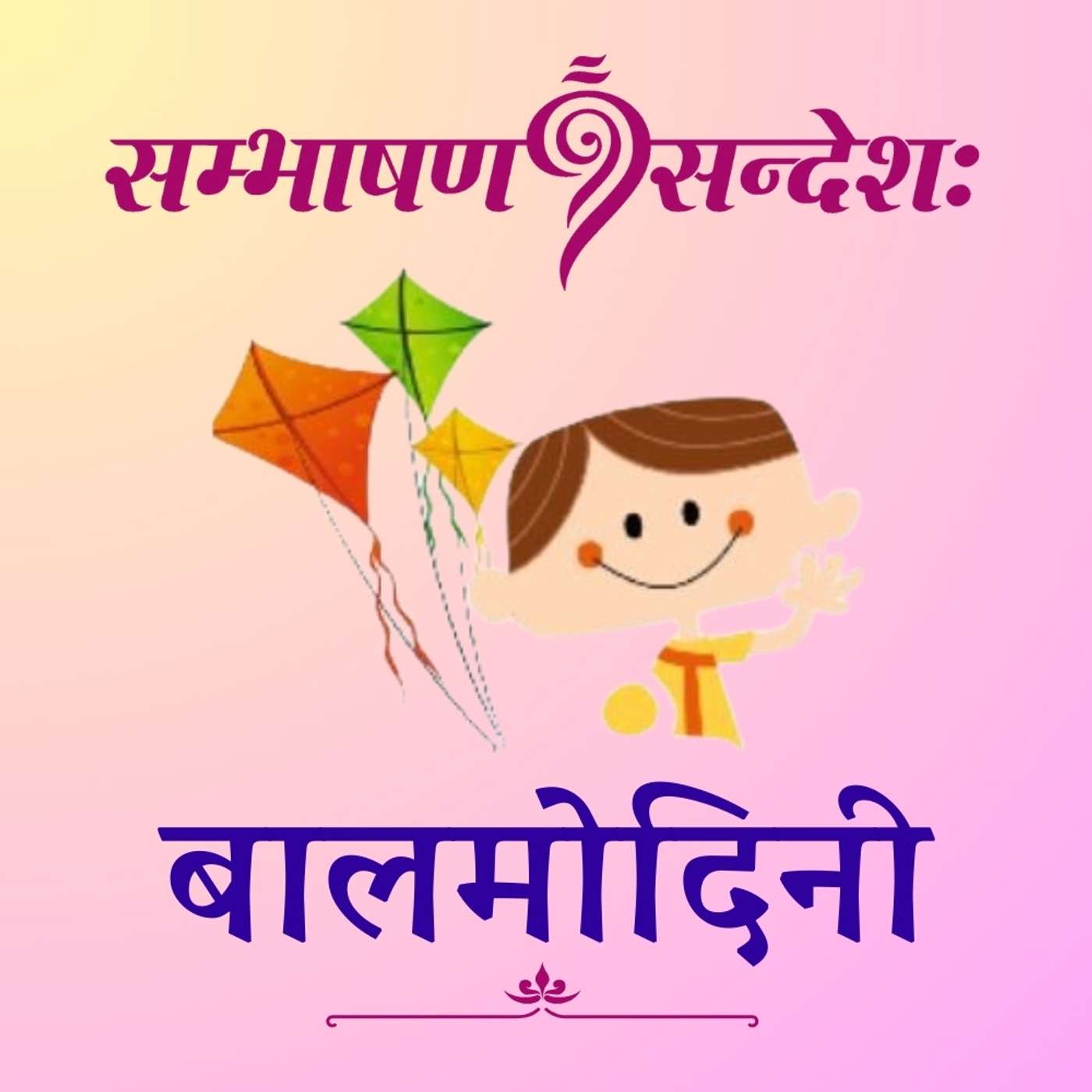बालमोदिनी
सम्भाषणसन्देशः इति संस्कृतमासिकपत्रिका (https://sambhashanasandesha.in) । एतस्यां पत्रिकायां प्रकाशिताः लेखाः, कथाः, बालकथाः, वार्ताः इत्यादिकं सर्वम् अपि सरलसंस्कृतेन एव प्रकाश्यते । तत्रत्याः “बालमोदिनी”नामिकाः बालकथाः अत्र प्रसार्यन्ते । अतः अस्याः शृङ्खलायाः नाम अपि “बालमोदिनी” एव । लघु गात्रं, सरला भाषा च कथानां विशेषः । प्रत्येकं कथा काञ्चित् नीतिं बोधयति । बालकथाः आबालवृद्धं सर्वेषां प्रियाः । संस्कृतेन ताः श्रोतुम् उपलब्धाः भवन्तु इति एषः प्रयत्नः श्रोतृभ्यः अवश्यं रोचेत इति विश्वासः । संस्कृतक्षेत्रे संस्कृतेन पॉड्कास्ट् क्रियमाणाः एताः प्रप्रथमाः कथाः इति सगौरवम् उद्घोष्यते । Sambhashana Sandesha is a Sanskrit monthly magazine (https://sambhashanasandesha.in). The articles, stories, children's stories, news, and other content published in this magazine are all presented in simple Sanskrit. Among these, the children's stories titled “Balamodini” are featured. The series is named “Balamodini” as well. The hallmark of these stories is their short length and simple language. Each story imparts a specific moral lesson. Children’s stories are cherished by everyone, young and old alike. It is believed that listeners will appreciate this effort to make these stories available in Sanskrit. These are the first stories to be podcasted in the Sanskrit language within this field.
धनं देशसेवायै
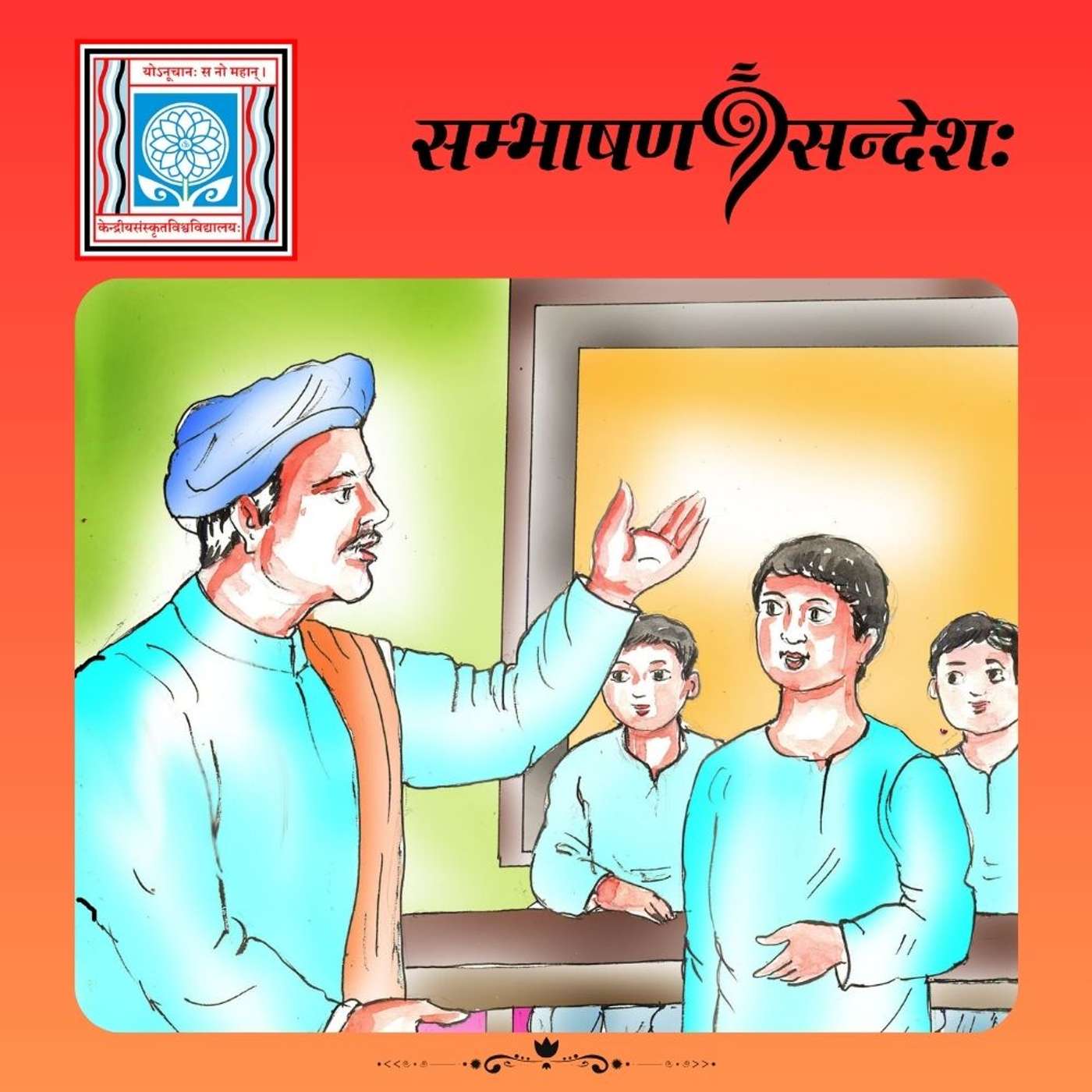
कस्याञ्चित् कक्ष्यायां प्रवृत्ता घटना एषा । अचार्यः कक्ष्यां प्रविश्य छात्रेभ्यः एकं प्रश्नं पृच्छति 'मार्गे गमनसमये वज्रं दृश्येत तर्हि किं कुर्युः भवन्तः' इति । तदा सर्वे स्वीयम् अभिप्रायं वदन्ति । किन्तु कश्चन बालकः वदति 'वज्रं विक्रीय ततः प्राप्तं धनं देशसेवायै, निर्धनानां साहाय्याय वा व्ययीकरिष्यामि' इति । नितरां सन्तुष्टः आचार्यः देशभक्तत्वेन ख्यातः भव इति अशीर्वादं ददाति । सः एव गोपालकृष्णगोखले इति । सम्यक् प्रवर्धिष्यमाणस्य वृक्षस्य लक्षणम् अङ्कुरदशायाम् एव दृश्यते इत्येतत् सत्यं ननु ।
(“केन्द्रीयसंस्कृतविश्वविद्यालयस्य अष्टादशीयोजनान्तर्गततया एतासां कथानां ध्वनिप्रक्षेपणं क्रियते”)
This incident took place in a classroom. The teacher entered and asked the students, “If you see a diamond while walking on the road, what would you do?” Each student gave their own answer. But one boy said, “I would sell the diamond and use the money to serve the country or help the poor.” The teacher was deeply pleased and blessed him, saying, “You will be known as a patriot.” That boy was none other than Gopal Krishna Gokhale. Truly, the qualities of a great tree are visible even in its early sprouting stage.
गाननिपुणः उलूकः गानबन्धुः
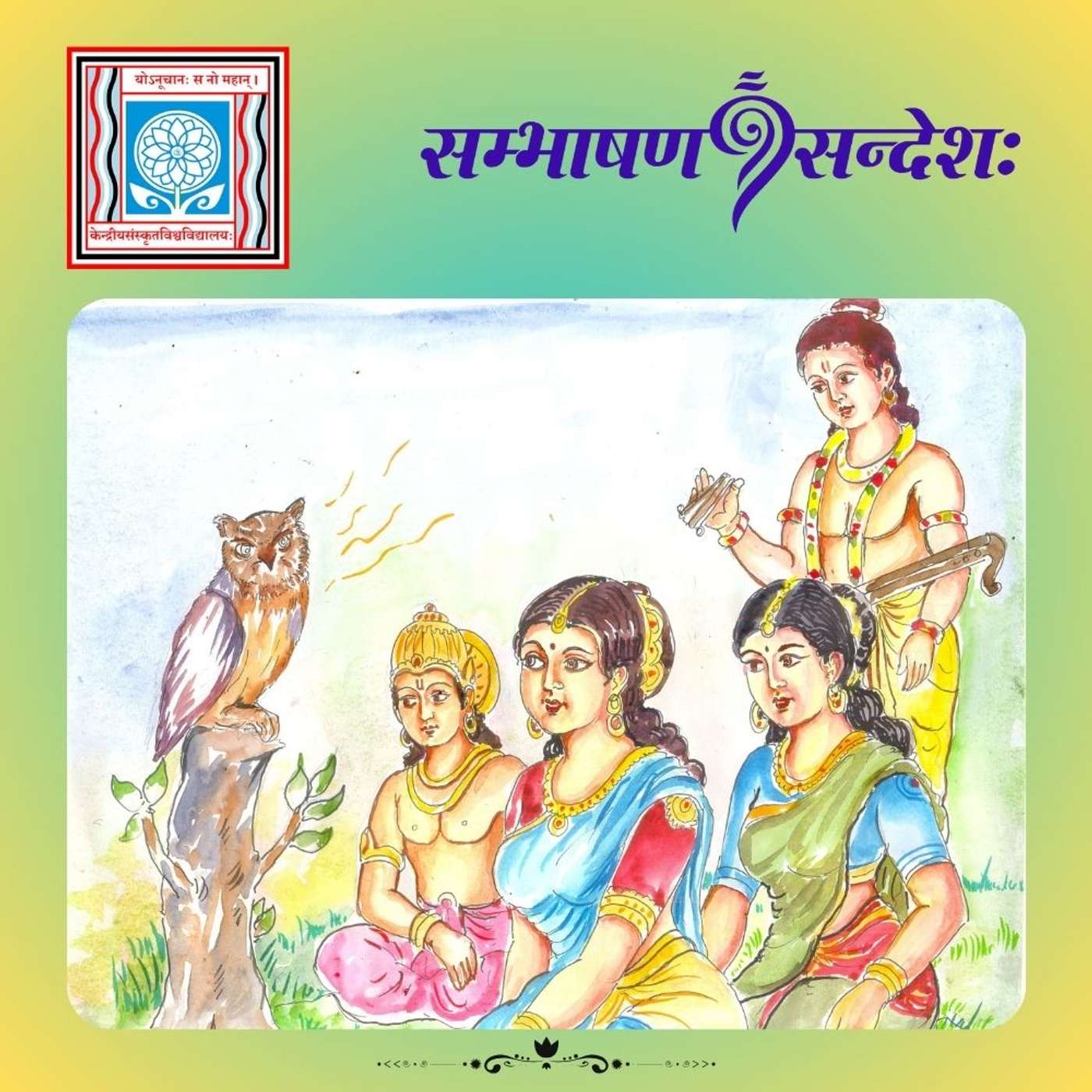
कदाचित् नारदमहर्षिणा कोपाधिक्यात् लक्ष्मीः शप्ता । तेन कारणेन नारदस्य सङ्गीतज्ञानं विलुप्तं जातम् । ततः नारदः पश्चात्तापम् अनुभवन् विष्णुम् उपसर्प्य कृतस्य दोषस्य परिहारम् अपृच्छत् । तदा विष्णुः 'गानबन्धुनामकस्य दिव्योलूकस्य समीपं गत्वा तस्मात् गानं शिक्षेत' इति अवदत् । अनन्यगतिकया नारदः गानबन्धोः समीपं गत्वा प्रवृत्तं सर्वं निवेद्य तदीयं शिष्यत्वम् अङ्गीकृत्य सङ्गीतं शिक्षयितुं प्रार्थितवान् । ततः नारदः गानबन्धुतः सङ्गीतं शिक्षित्वा पुनरपि गानसामर्थ्यं प्राप्तवान् ।
(“केन्द्रीयसंस्कृतविश्वविद्यालयस्य अष्टादशीयोजनान्तर्गततया एतासां कथानां ध्वनिप्रक्षेपणं क्रियते”)
Once, Sage Narada was angered by Goddess Lakshmi and he cursed her. As a result, Narada lost his knowledge of music. Feeling regretful, he approached Lord Vishnu and asked how he could correct his mistake. Vishnu advised him to go to a divine owl named Gānabandhu and learn music from him. With no other option, Narada went to Gānabandhu, explained everything, and humbly requested to become his student. Gānabandhu accepted Narada as a disciple and began teaching him music. Narada learned with devotion and eventually regained his musical abilities. Thus, through humility and effort, Narada restored what he had lost.
मानसपूजायाः महिमा
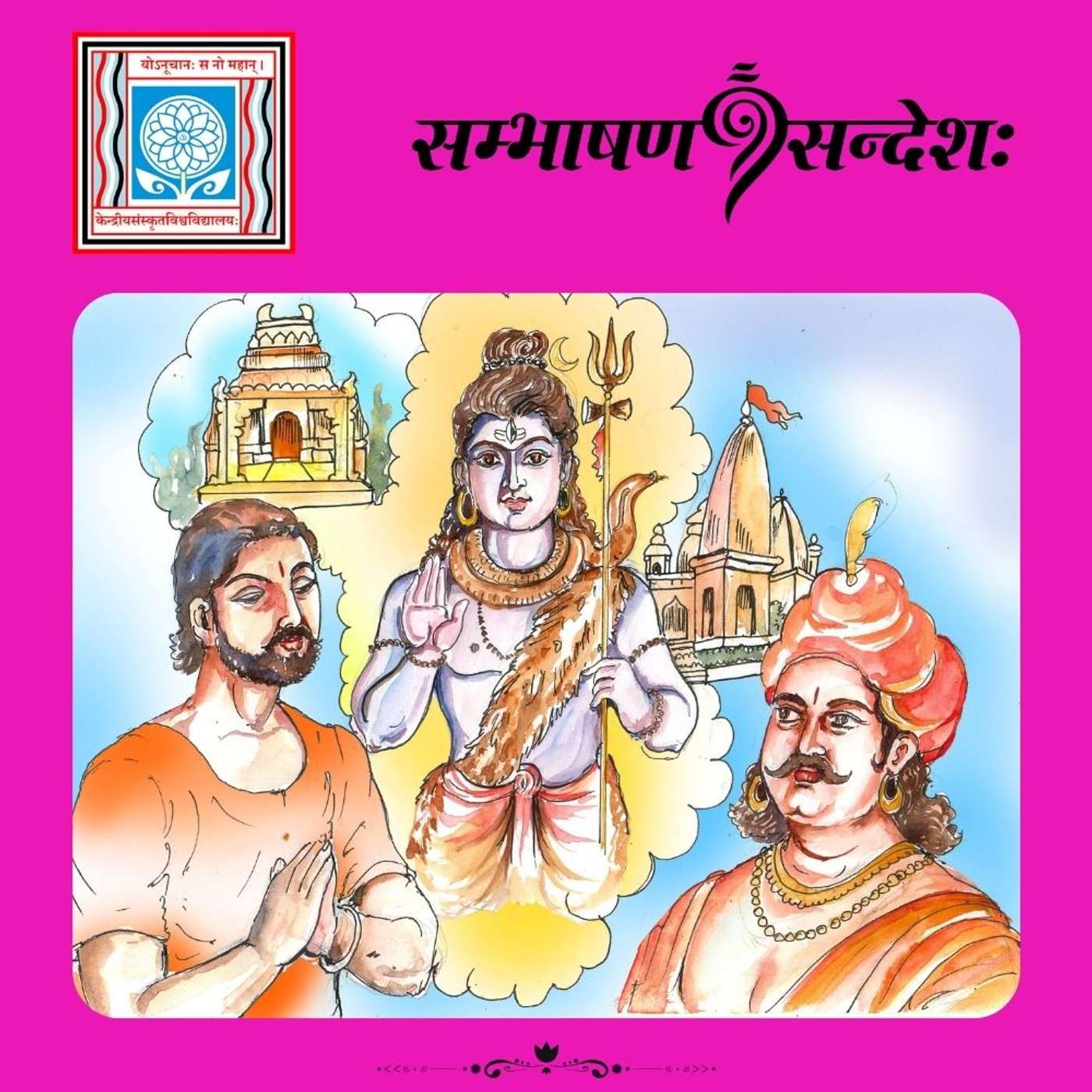
पूसलारनामा कश्चन निर्धनः शिवभक्तः शिवालयं निर्मातुम् ऐच्छन् स्वस्य असामर्थ्यं स्मृत्वा मनसि एव शङ्करस्य देवालयं रचयितुम् आरब्धवान् । स्वस्य चित्ते एव इष्टिकाः, दारुस्तम्भाः, फलकानि इत्यादीनि सङ्गृह्य शुभदिने देवालयकार्यम् आरभ्य शुभमुहूर्तं चित्वा कुम्भाभिषेकं कर्तुं निश्चितवान् । तस्मिन् एव दिने काञ्चीनगरस्य कश्चन राजा, तेन निर्मितस्य शिवदेवालस्य कुम्भाभिषेकमुहूर्तं निश्चितवान् । किन्तु शिवः राज्ञः स्वप्नम् आगत्य 'अन्यस्मिन् दिने कुम्भाभिषेकः क्रियताम् । तस्मिन् दिने पूसलारस्य देवालयं गच्छामि' इति । अहो! मानसपूजायाः महिमा ।
(“केन्द्रीयसंस्कृतविश्वविद्यालयस्य अष्टादशीयोजनान्तर्गततया एतासां कथानां ध्वनिप्रक्षेपणं क्रियते”)
There was once a poor devotee of Lord Shiva named Poosalar. He wished to build a temple for Shiva but lacked the money and resources. So, he began constructing the temple in his mind, imagining bricks, wooden pillars, and beams with great devotion. He chose an auspicious day and mentally planned the temple’s consecration ceremony (Kumbhabhishekam). On the same day, a king in Kanchipuram had also scheduled the consecration of a grand Shiva temple he had built. But Lord Shiva appeared in the king’s dream and said, “Do the ceremony on another day. I will be visiting Poosalar’s temple that day.” Such is the greatness of mental worship—pure devotion reaches the divine even without physical offerings.
भाग्ये यत् लिखितं तदेव प्राप्यते
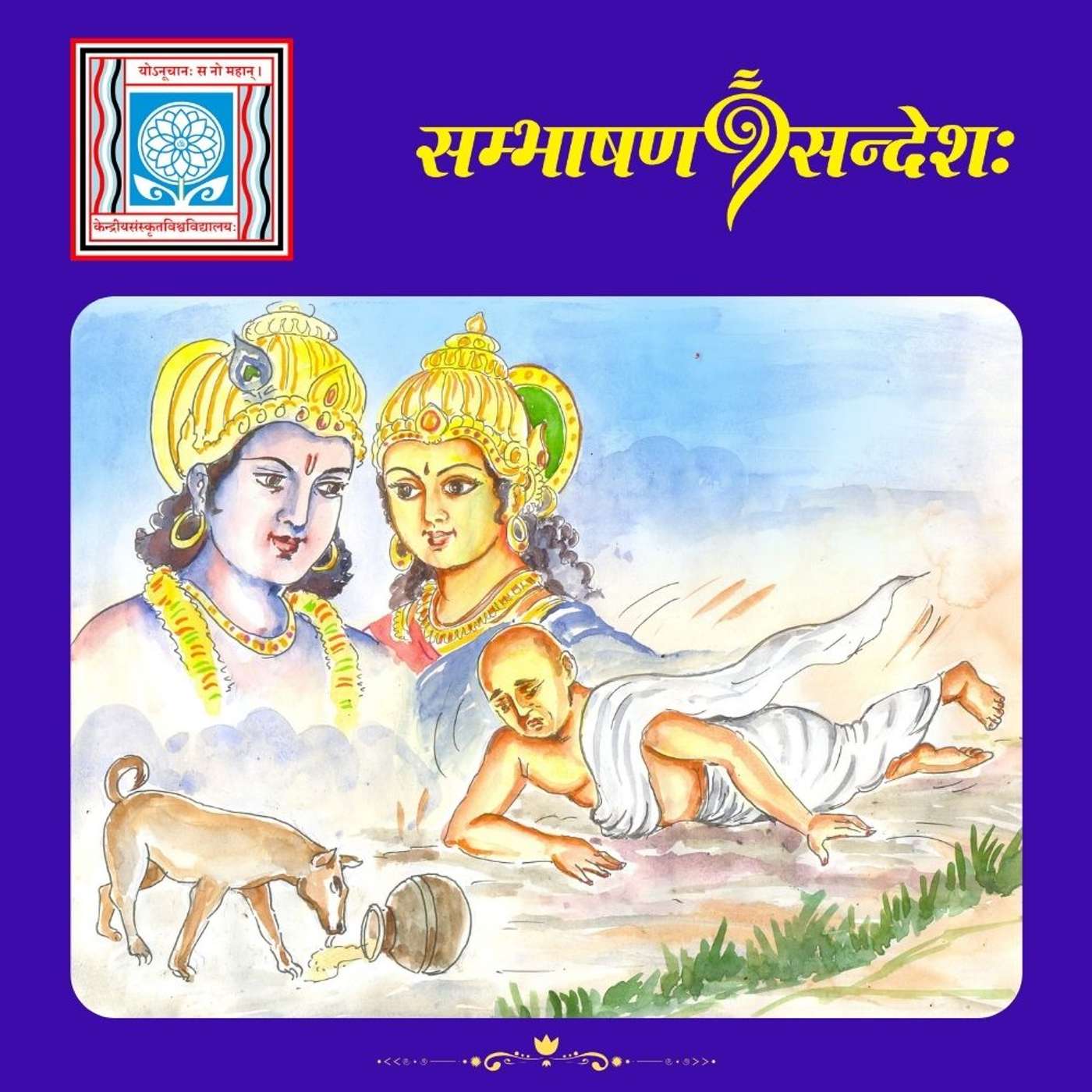
कदाचित् श्रीकृष्णलक्ष्म्योः मध्ये सुदाम्नः जीवनावस्थायाः चर्चा भवति । तदा श्रीकृष्णः वदति 'प्रारब्धं नाम किञ्चन तत्त्वम् अस्ति । तत् कस्मै अपि जनाय समयात् पूर्वं भाग्यात् अधिकं न ददाति' इति । तदा तत् अनङ्गीकृत्य लक्ष्मीः भिक्षाटनसमये कस्याश्चित् गृहस्वामिन्याः मनसि सुदामविषये अनुकम्पाम् उत्पादितवती । तस्य परिणामतः सुदामा पायसं प्राप्तवान् । गृहगमनसमये मार्गे सः पादस्खलनात् भूमौ अपतत् । समग्रं पायसं मृत्तिकामिश्रितं तत् कुक्कुरस्य भोजनम् अभवत् । तत् दर्शयन् श्रीकृष्णः अवदत् 'भाग्ये यत् लिखितं तदेव प्राप्यते' इति ।
(“केन्द्रीयसंस्कृतविश्वविद्यालयस्य अष्टादशीयोजनान्तर्गततया एतासां कथानां ध्वनिप्रक्षेपणं क्रियते”)
Once, Shri Krishna and Goddess Lakshmi were discussing the life of Sudama. Krishna said, “There is a principle called destiny. It never gives anyone more than what is written in their fate before the right time.” Lakshmi did not agree and, during her visit to a household while begging, she created compassion in the heart of the lady for Sudama. As a result, Sudama received a bowl of sweet (payasam). On his way home, he slipped and fell to the ground. The entire payasam got mixed with mud and was eaten by a dog. Seeing this, Krishna said, “One only receives what is written in their destiny.”
अन्तरङ्गशुद्धिः
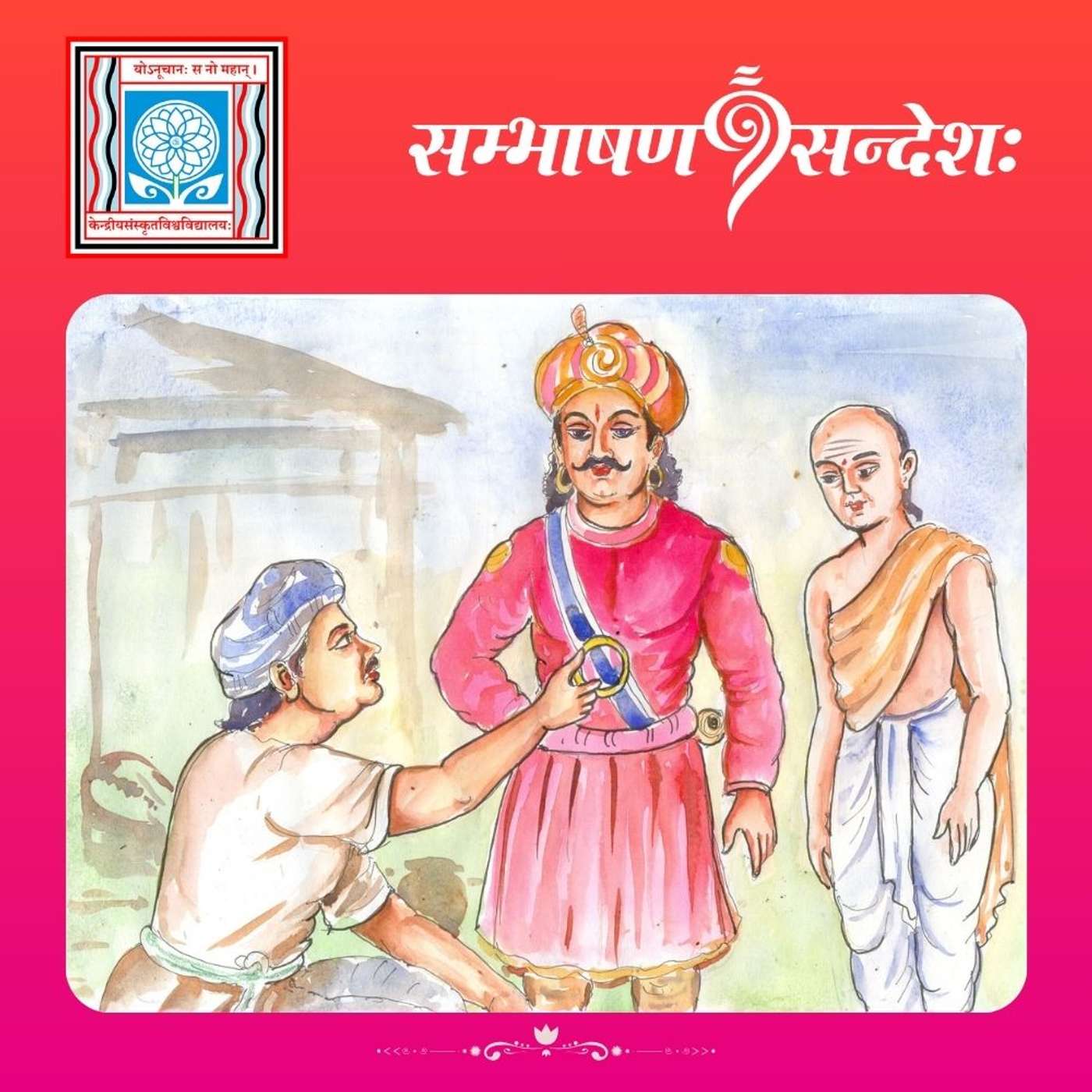
वारणास्यां गङ्गाघट्टसमीपे छिन्नपादरक्षासीवनं कुर्वता गङ्गामातुः भक्तेन रूयिदासेन कदाचित् गङ्गास्नानाय गन्तुं समयः न लब्धः । अतः सः नाणकमेकं गङ्गामात्रे समर्पयितुं कस्मैचित् ब्राह्मणाय अयच्छत् । यदा सः ब्राह्मणः गङ्गामात्रे अर्पितवान् तदा गङ्गामाता सुवर्णकङ्कणमेकं रूयिदासाय दीयताम् इति ब्राह्मणस्य हस्ते अधत्त । किन्तु दुराशां प्राप्तवता ब्राह्मणेन तत् कङ्कणं राजगृहं विक्रेतुं नीतम्, । संशयं प्राप्तवान् राजा यदा एतादृशम् अन्यत् कङ्कणम् आनय इति अवदत् तदा भीत्या सः प्रवृत्तं सर्वम् अवदत् । तदा राजा रूयिदासम् आहूय 'यदि भवान् गङ्गामातुः पुत्रः इति सत्यं चेत् एतत्सदृशम् अन्यत् कङ्कणम् आनीय ददातु' इति अवदत् । रूयिदासः गङ्गामातरं मनसि ध्यायन् पादरक्षाशुद्धीकरणनिमित्तं स्थापितस्य जलकरण्डकस्य अन्तः हस्तं प्रसारितवान् । अनुक्षणम् अन्यत् कङ्कणं प्राप्य महाराजाय यच्छन् अवदत् 'अन्तरङ्गं यदि निर्मलं स्यात् तर्हि यत्र कुत्रापि गङ्गा द्रष्टुं शक्या' इति ।
(“केन्द्रीयसंस्कृतविश्वविद्यालयस्य अष्टादशीयोजनान्तर्गततया एतासां कथानां ध्वनिप्रक्षेपणं क्रियते”)
Once, in Varanasi near the banks of the Ganga, a devotee named Ruyidas was busy stitching torn footwear. He could not find time to take a bath in the Ganga, so he gave a coin to a Brahmin and asked him to offer it to Mother Ganga on his behalf. When the Brahmin made the offering, Mother Ganga placed a golden bracelet in his hand, asking him to give it to Ruyidas. But the Brahmin, overcome by greed, took the bracelet to the royal palace to sell it. The king became suspicious and asked him to bring another bracelet like it. Frightened, the Brahmin confessed everything. The king then summoned Ruyidas and said, “If you are truly the son of Mother Ganga, bring another bracelet like this.” Ruyidas, meditating on Mother Ganga, dipped his hand into the water kept for cleaning shoes. Instantly, he received another bracelet and offered it to the king, saying, “If the heart is pure, Ganga can be seen anywhere.”
मनः दर्पणः एव
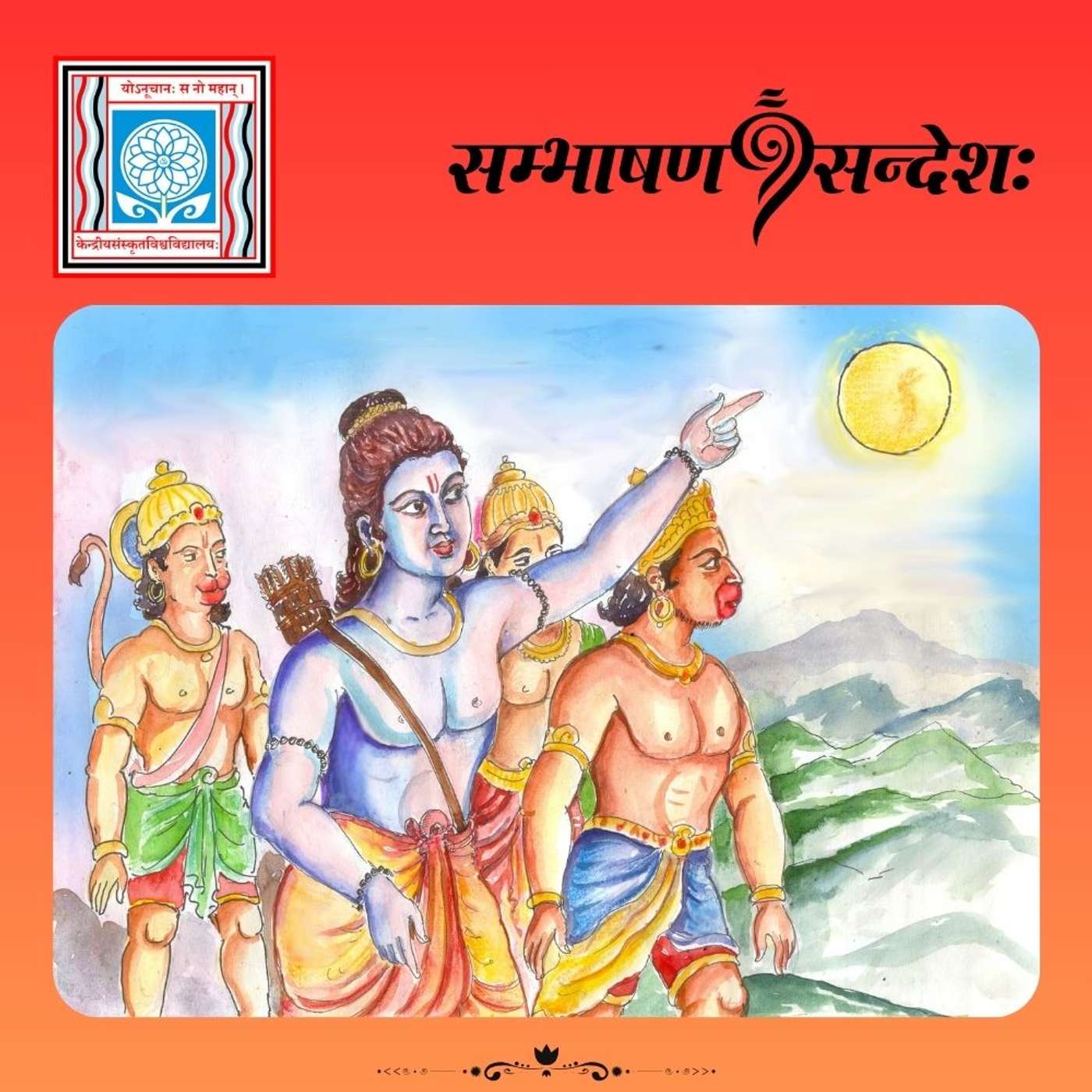
कदाचित् श्रीरामः हनुमदादिभिः सह सुवेलपर्वतशिखरं गतः । तत्र दृश्यमानं चन्द्रं दर्शयन् स्वस्य स्वस्य चिन्तनानुगुणं चन्द्रे दृश्यमानायाः कृष्णवर्णतायाः कारणं किं भवितुमर्हति इति अपृच्छत् । राजा सुग्रीवः, अग्रजात् प्रहारं प्राप्य राज्यात् निर्गतः विभीषणः, सिंहासनस्य उत्तराधिकारित्वं प्राप्तुं योग्यतायां सत्याम् अपि युवराजपदमात्रं प्राप्तवान् अङ्गदः, प्रियसहोदरः, सीतावियोगदुःखतप्तः च रामः, रामभक्तः आञ्जनेयः च स्वीयं स्वीयं कारणं वदन्ति । अत्र चन्द्रः अस्माकं मनः इव । अन्तःकरणभावस्य अनुगुणं वयं दर्पणरूपे मनसि अन्येषाम् आकारं पश्यामः ।
(“केन्द्रीयसंस्कृतविश्वविद्यालयस्य अष्टादशीयोजनान्तर्गततया एतासां कथानां ध्वनिप्रक्षेपणं क्रियते”)
Once, Shri Rama went to the top of Suvela mountain with Hanuman and others. There, he saw the moon and asked why it appeared dark in some places. Each person gave a reason based on their own thoughts and experiences. Sugriva, bearing the pain caused by his elder brother’s attack, Vibhishana, being exiled despite being worthy of the throne, Angada, with sorrow of not becoming king even though he deserved it, Rama, with grief over being separated from Sita, and Hanuman, with his deep devotion express their own reasons. The moon here is like our mind—what we see in it reflects our inner emotions.
वेदविदः पक्षिणः
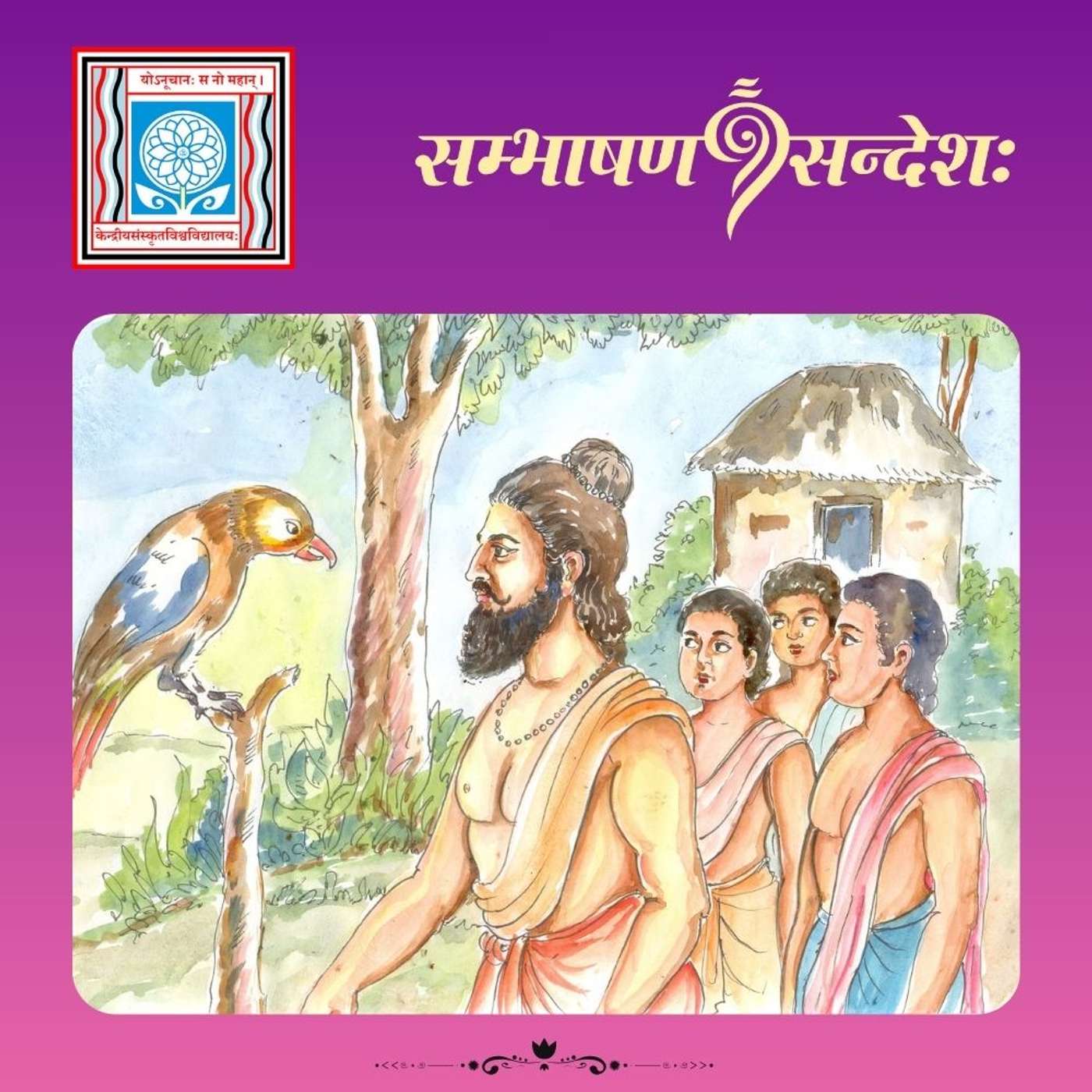
महाभारतयुद्धस्य अनन्तरम् ऋषिः शमिकः रणरङ्गं गतः । तत्र लघुपक्षिणां कूजनं श्रुतम् । तान् स्वस्य आश्रमं नीत्वा जागरूकतया पोषितवान् । छात्राणाम् अध्यापनसमये पक्षिभिः अपि वेदाः, विविधानि शास्त्राणि च शिक्षितानि । एकस्मिन् दिने पक्षिणां मुखात् वेदमन्त्रान् श्रुत्वा मुन्यादयः महत् आश्चर्यं प्राप्तवन्तः । शमिकः अपृच्छत् यत् कथं ते मनुष्याः इव भाषणे समर्थाः इति । तदा ते पूर्वजन्मनि प्रवृद्धं सर्वम् अवदन् ।
(“केन्द्रीयसंस्कृतविश्वविद्यालयस्य अष्टादशीयोजनान्तर्गततया एतासां कथानां ध्वनिप्रक्षेपणं क्रियते”)
After the Mahabharata war, the sage Shamika went to the battlefield. There, he heard the chirping of small birds. He took them to his ashram and carefully looked after them. While teaching his students, the birds also learned the Vedas and various scriptures. One day, the sages were amazed to hear Vedic chants coming from the birds’ mouths. Shamika asked how they were able to speak like humans. The birds then revealed that they had gained all this knowledge in their previous birth.
बुद्धिर्यस्य फलं तस्य
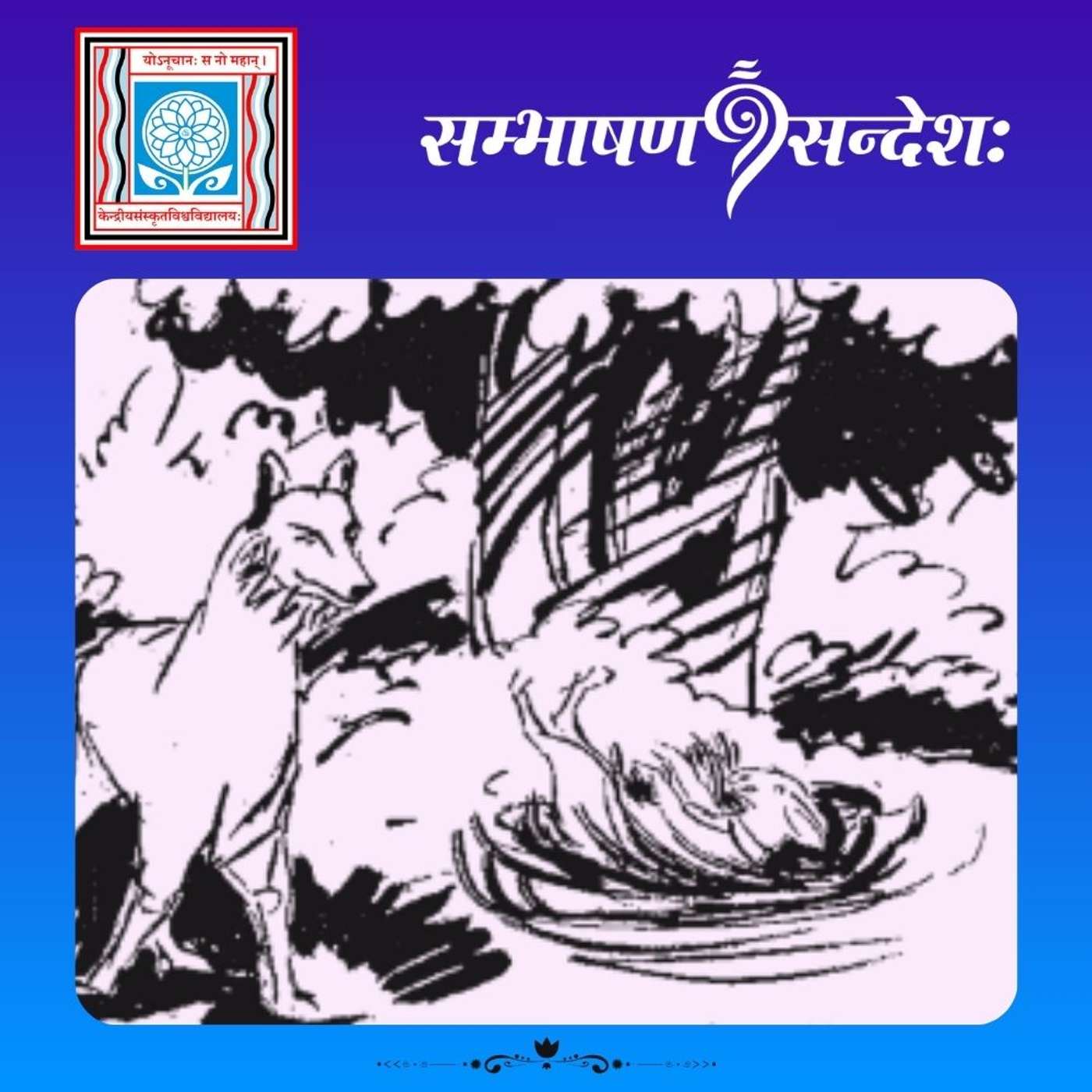
मातुः वचनम् उपेक्ष्य कश्चन अजशावकः अजसमूहात् दूरं गत्वा अरण्यं प्राविशत् । तदा कश्चन महाकायः वृक पुरतः आगतः । कथमपि आत्मरक्षणं करोमि इति विचिन्त्य सः एकम् उपायं करोति । उच्चैः क्रन्दन् अवद्त् 'भ्रातः ! मह्यं जलं ददातु । अहं विषपर्णं खादितवान् अस्मि । मम सर्वम् अङ्गम् इदानीं विषमयं जातम्' इति वदन् निश्चेष्टः सन् अतिष्ठत् । तदा वृकः 'एतस्य मांसं खादित्वा अहमपि मृतः भविष्यामि' इति विचिन्त्य ततः अधावत् । तदनन्तरम् अजशावकः शीघ्रं धावन् गोष्ठं प्राप्नोत् । पुनः कदापि सः मातुः वचनं न उपेक्षितवान् ।
(“केन्द्रीयसंस्कृतविश्वविद्यालयस्य अष्टादशीयोजनान्तर्गततया एतासां कथानां ध्वनिप्रक्षेपणं क्रियते”)
Ignoring his mother’s advice, a young goat wandered away from the herd and entered the forest. Suddenly, a large wolf appeared before him. Thinking of a way to save himself, the goat cried out loudly, "Brother! Give me water. I have eaten a poisonous leaf, and now my whole body is filled with venom". He then lay still. The wolf, fearing that eating the goat’s flesh would poison him too, fled. The young goat quickly ran back to the herd and never ignored his mother’s words again.
फलं परनिन्दायाः
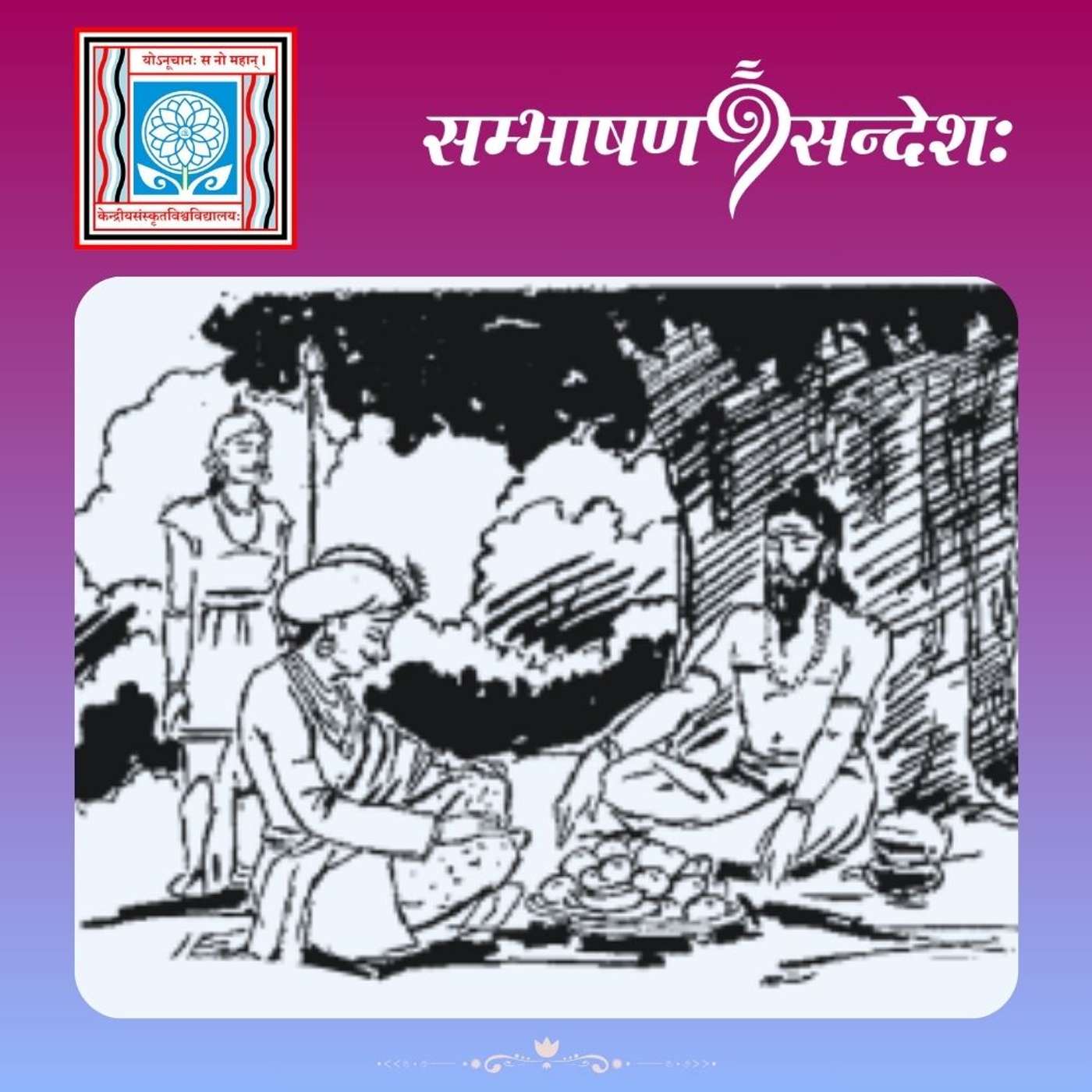
पुरा काशीनगरे कश्चन धर्मात्मा प्रजावत्सलः च राजा आसीत् । कदाचित् मृगयार्थं गच्छतं राजानं कश्चन देवदूतः आकाशात् अवतीर्य 'भवतः कृते स्वर्गलोके सुवर्णप्रासादः सज्जीकृतः अस्ति' इत्युक्त्वा अन्तर्हितः अभवत् । पुनः कदाचित् राजा वने स्थितं कञ्चन तपस्विनं द्रष्टुं गतः । ध्यानमग्नः तपस्वी नेत्रे न उद्घाटितवान् । क्रुद्धः राजा पार्श्वे पतितम् अश्वपुरीषं तपस्विनः शिरसि क्षिप्त्वा ततः निर्गतवान् । एकदा रात्रौ सः देवदूतः पुनः आगत्य 'स्वर्गलोके भवतः प्रासादः अश्वपुरीषैः पूर्णः अस्ति' इति अवदत्। यः परनिन्दकः सः तस्य पापानि भुङ्क्ते । अतः कथञ्चित् सः पापानि क्षालितवान् । अनन्तरं सः बहुः जागरूकतया राज्यं कृतवान् । स्वर्गं च प्राप्तवान् ।
(“केन्द्रीयसंस्कृतविश्वविद्यालयस्य अष्टादशीयोजनान्तर्गततया एतासां कथानां ध्वनिप्रक्षेपणं क्रियते”)
Long ago, in Kashi, there was a righteous and compassionate king. One day, while hunting, a divine messenger appeared and told him, "A golden palace has been prepared for you in heaven" before disappearing. Later, the king visited a meditating sage in the forest. When the sage did not open his eyes, the angry king threw horse dung on his head and left. One night, the messenger returned and said, "Your palace in heaven is now filled with horse dung". Realizing the consequences of his actions, the king repented, ruled wisely, and ultimately attained heaven.
श्रेष्ठतमं कार्यम्
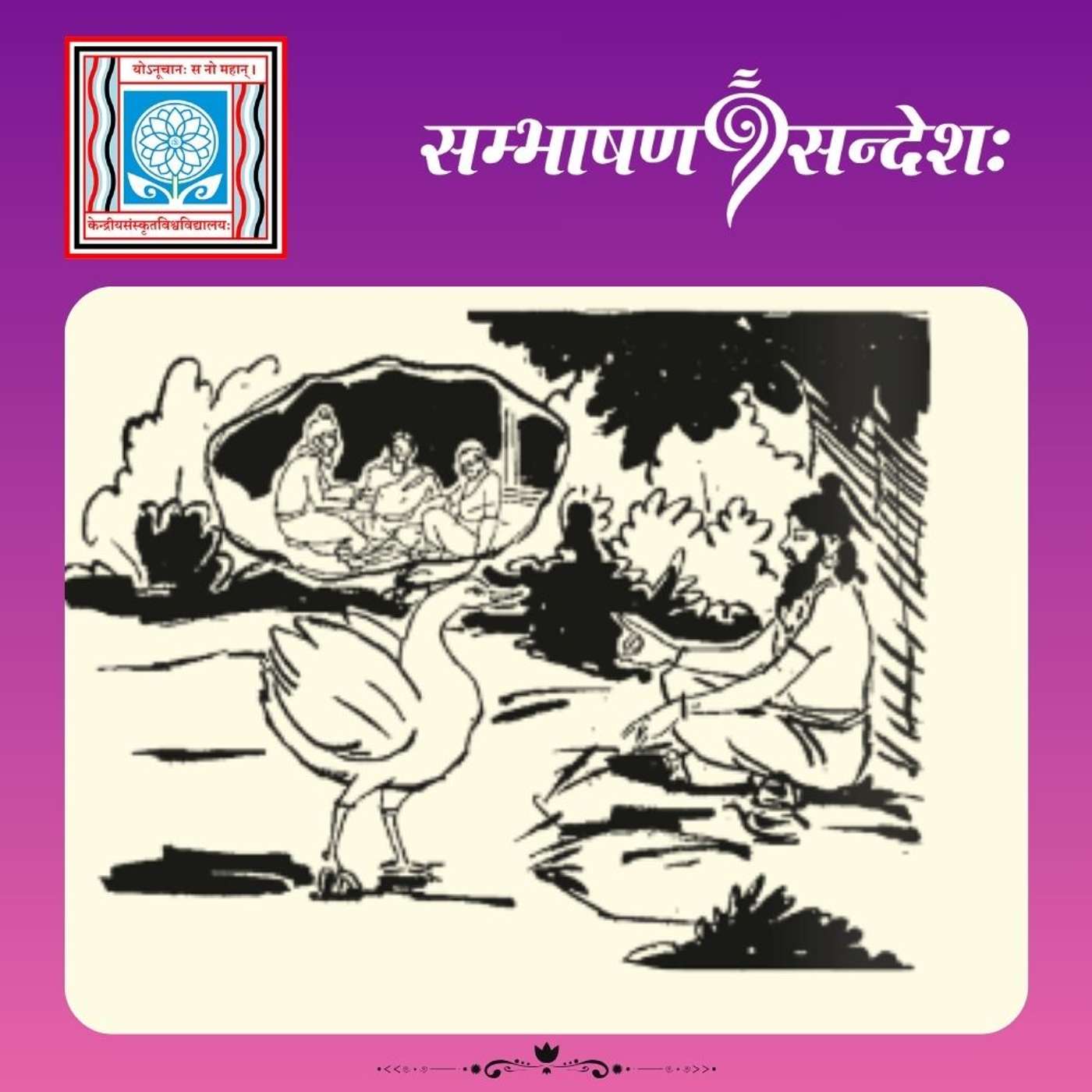
पिप्पलः नाम कश्चन संन्यासी तपः आचर्य इन्द्रात् वरं प्राप्य अहङ्कारी जातः । कदाचित् पितामहः ब्रह्मा 'एतस्य अहङ्कारः निवारणीयः' इति विचिन्त्य सारसरूपं धृत्वा पिप्पलस्य समीपम् आगत्य 'भवान् किमर्थम् आत्मानं श्रेष्ठं मन्यते । कुण्डलस्य पुत्रः सुकर्मा यद्यपि तपः न आचरितवान् भवदपेक्षया ज्ञानी अस्ति' इति । आश्चर्यभरितः पिप्पलः सुकर्मणः समीपं गत्वा तस्य ज्ञानस्य रहस्यम् अपृच्छत् । तदा सुकर्मा अवदत् 'अहं चिन्तयामि यत् मातापित्रोः सेवायाः परिणामतः एव अहं कामपि सिद्धिं प्राप्तवान्' इति । एतत् श्रुत्वा पिप्पलस्य ज्ञाननेत्रे उद्घाटिते । गर्वस्य अपगमनेन सः विनयशीलः सञ्जातः ।
(“केन्द्रीयसंस्कृतविश्वविद्यालयस्य अष्टादशीयोजनान्तर्गततया एतासां कथानां ध्वनिप्रक्षेपणं क्रियते”)
A sage named Pippala, after receiving a boon from Indra, became arrogant due to his intense penance. Seeing this, Brahma decided to humble him. Disguised as a learned man, Brahma approached Pippala and said, "Why do you consider yourself superior? Though Kundala’s son, Sukarma, has not performed penance, he possesses greater wisdom than you". Amazed, Pippala went to Sukarma and asked about the secret of his knowledge. Sukarma replied, "I believe that my wisdom is the result of serving my parents with devotion". Hearing this, Pippala’s eyes were opened to true wisdom. Shedding his arrogance, he became humble and virtuous.
अन्नदातुः वृत्तिः
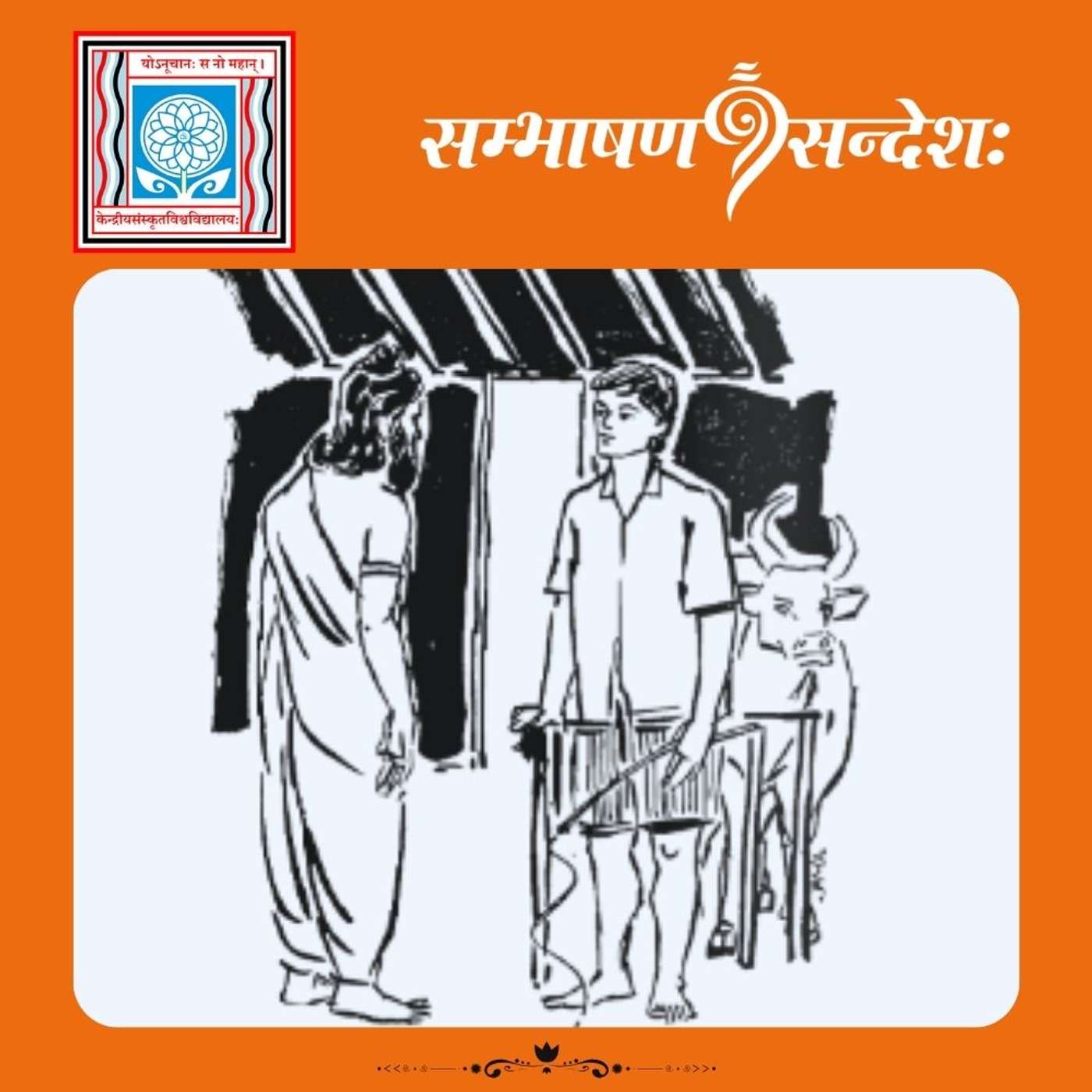
एकदा प्रवासं कुर्वता सत्पुरुषेण पिपासानिवारणार्थं मार्गमध्ये विद्यमानं कुटीरस्वामिनं जलं याचितम् । जलं पीत्वा अप्रसन्नमनस्कः सन् ततः यावत् गन्तुम् उद्युक्तः तदा 'किञ्चित् क्षीरं पीत्वा गच्छतु' इति स्वमी उक्तवान् । पुनः पुनः अनुरोधेन सत्पुरुषः चमसपरिमितमेव क्षीरं पीतवान् । अस्वस्थमनस्कः सः अवदत् यत् 'एषा धेनुः भवता चोरिता अस्ति । भवता दत्तं क्षीरं पीत्वा 'भवतः धेनुः चोरयितव्या' इति विचारः मम मनसि आगतः । यदा अन्नं स्वीकरिष्यामि तदा एव मनसि विशिष्टाः तरङ्गाः उद्भवन्ति । तैः तरङ्गैः अन्नदातुः वृत्तिं जानामि' इति ।
(“केन्द्रीयसंस्कृतविश्वविद्यालयस्य अष्टादशीयोजनान्तर्गततया एतासां कथानां ध्वनिप्रक्षेपणं क्रियते”)
One day, a noble traveler, feeling thirsty, asked the owner of a roadside cottage for water. After drinking, he was about to leave when the owner insisted, "Please have some milk before you go". Despite repeated requests, the traveler drank only a small amount. However, he felt uneasy and said, "This cow has been stolen by you. After drinking the milk, the thought of stealing your cow arose in my mind. Whenever I consume food, unique thoughts emerge, revealing the nature of the giver".
मन्त्रिणः युक्तिः
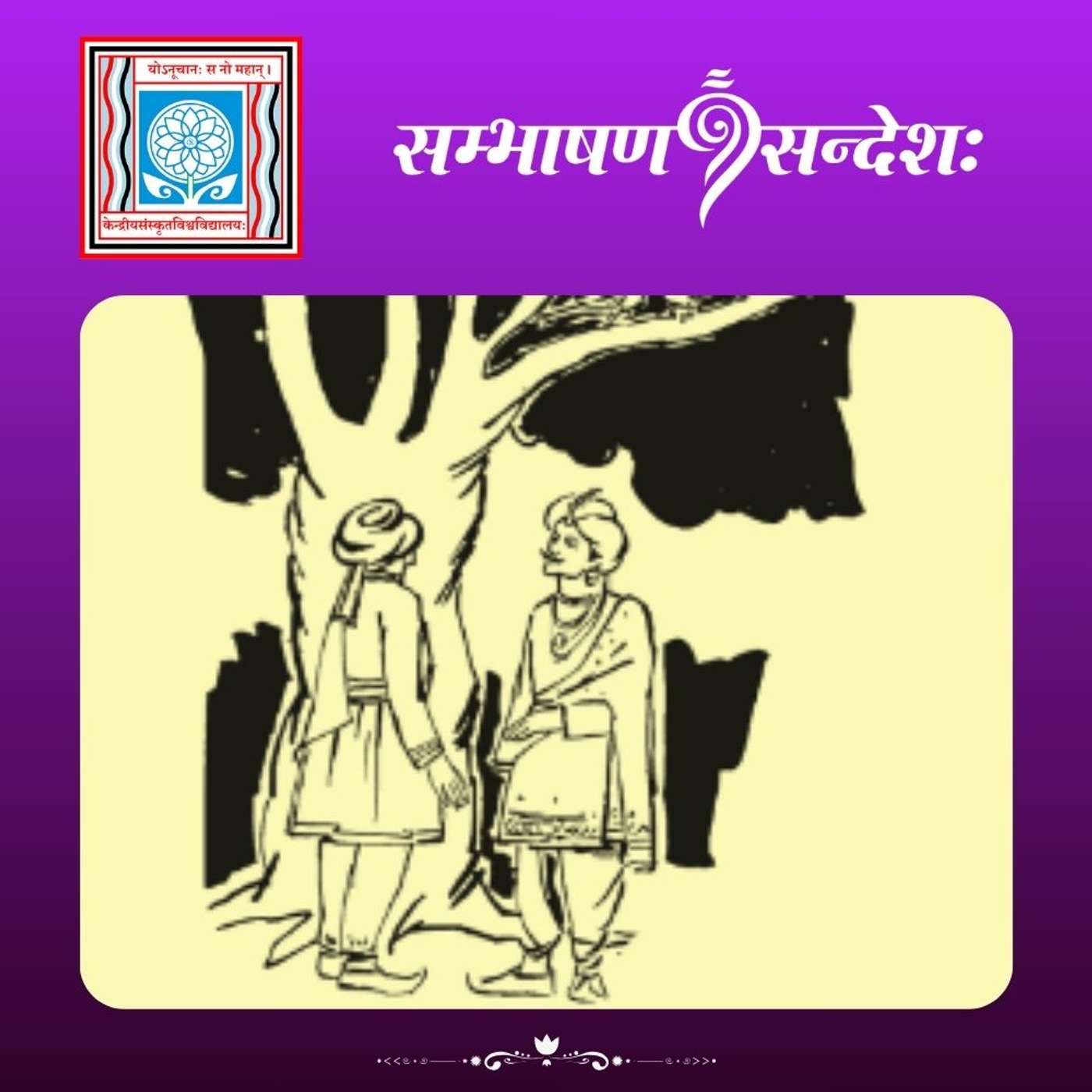
पुरा कस्यचन महाराजस्य राज्यशासने अनासक्तिः आसीत् । गच्छता कालेन राज्यस्य दुःस्थितिः आगता । माहाराजस्य मन्त्रिषु अन्यतमः कश्चन मन्त्री कथमपि महाराजः बोधनीयः इति निश्चयम् अकरोत् । एकस्मिन् सायङ्काले वायुविहारसमये मन्त्री पक्षिणः कलरवं श्रद्धया कर्णौ दत्त्वा श्रोतुम् आरब्धवान् । यदा महाराजः अपृच्छत् तदा मन्त्री 'अहं पक्षिणः भाषां जानामि' इत्युक्त्वा तस्य मनसि यत् राज्ञे बोधनीयम् इति आसीत् तत् सर्वं पक्षिणः सम्भाषणरूपेण अनूदितवान् । महाराजस्य ज्ञानोदयः अभवत् । 'सर्वे मिलित्वा च राज्यं सुभिक्षं करिष्यामः' इति उक्त्वा तं मन्त्रिणं प्रधानमन्त्रिणं कृत्वान् ।
(“केन्द्रीयसंस्कृतविश्वविद्यालयस्य अष्टादशीयोजनान्तर्गततया एतासां कथानां ध्वनिप्रक्षेपणं क्रियते”)
Once, a great king became indifferent to governance, leading to the kingdom's decline over time. One of his ministers decided that the king must somehow be made aware of the situation. One evening, during a walk, the minister attentively listened to the chirping of birds. When the king asked about it, the minister claimed, "I understand the language of birds" and then conveyed everything the king needed to realize in the form of a bird’s conversation. This awakened the king’s wisdom. Declaring, "Together, we shall restore prosperity to the kingdom," he appointed the minister as the chief advisor.
मातृऋणम्
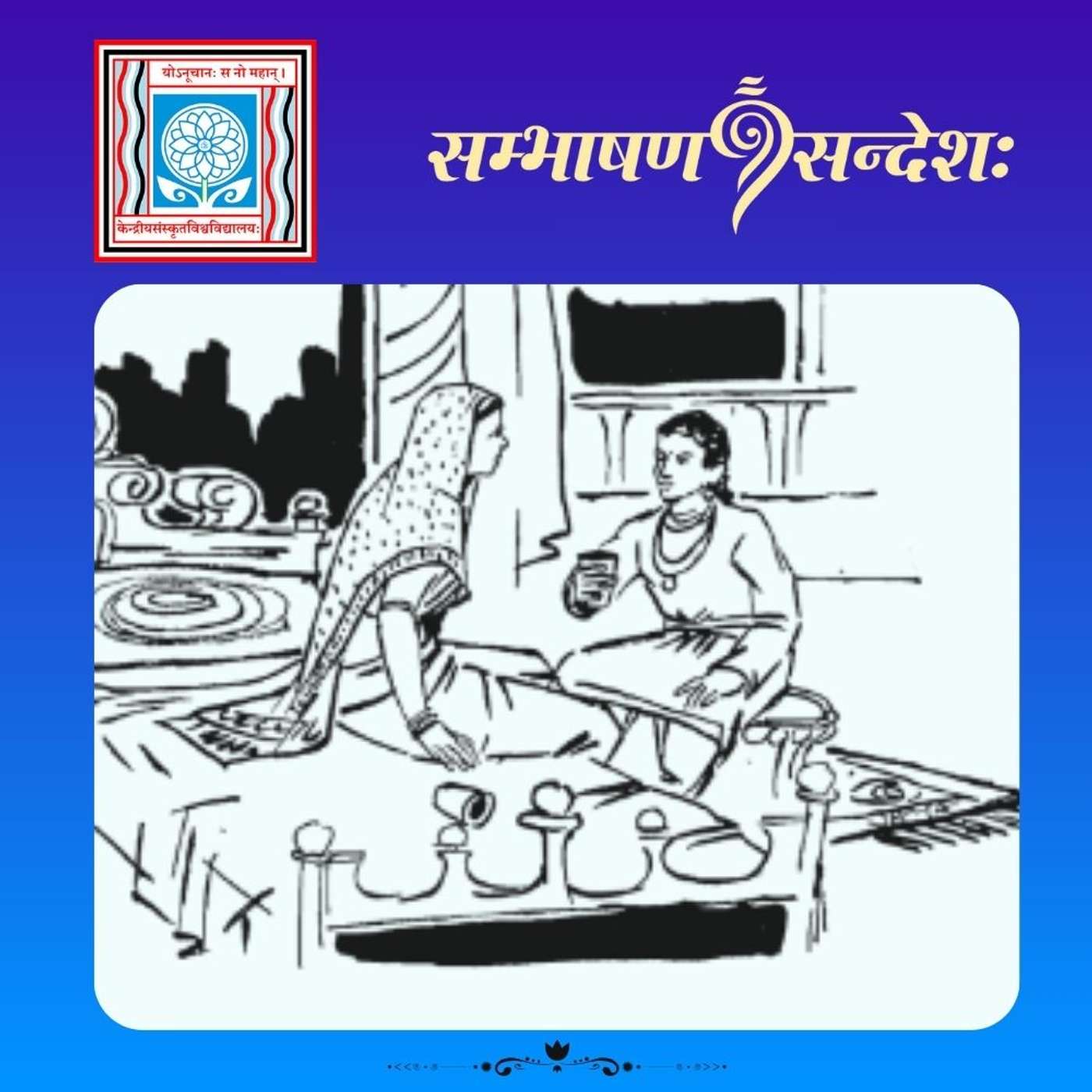
सुप्रसिद्धः राजा देवव्रतः कदाचित् स्वमातरं पद्मावतीम् अवदत् 'पितुः आज्ञानुसारेण राज्यस्य उत्तरदायित्वं निर्वहन् अस्मि । गुरुणा प्रदत्तायाः शिक्षायाः सदुपयोगं कृतवान् अस्मि । अतः अहं भूमेः, गुरोः, पितुः, मातुः च ऋणात् मुक्तः अस्मि' इति । पुत्रस्य एतादृशीं वार्तां श्रुत्वा पद्मावती अहसत् । अनन्तरं सा एकेनैव उदाहरणेन दर्शयति यत् कथं मातुः ऋणात् मुक्तः भवितुं न अर्हति इति । ततः सः मातुः क्षमां प्रार्थितवान् ।
(“केन्द्रीयसंस्कृतविश्वविद्यालयस्य अष्टादशीयोजनान्तर्गततया एतासां कथानां ध्वनिप्रक्षेपणं क्रियते”)
The renowned king Devavrata once told his mother, Padmavati, "I have fulfilled my responsibilities as per my father's command. I have made good use of the education given by my teacher. Thus, I am free from the debts of the land, my teacher, my father and my mother". Hearing this, Padmavati laughed. She then demonstrated, with a single example, how one can never be free from a mother’s debt. Realizing his mistake, Devavrata humbly sought his mother’s forgiveness.
स्वतन्त्रतायाः महत्त्वम्

कदाचित् कश्चन बालकः चिन्मयः सुमधुरं कूजन्तं पक्षिशावकं गृहीत्वा पञ्जरे स्थापितवान् । चिन्मयः आदिनं शावकं किमपि खादयितुं प्रयतमानः आसीत् किन्तु शावाकः किमपि अस्पृष्ट्वा मातरं स्मरन् व्याकुलतया क्रन्दनं कुर्वन् आसीत् । अनन्तरदिने प्रातः एकः पक्षी एतं शावकं किमपि खादयन् आसीत् । तद् दृष्ट्वा यदा चिन्मयः पञ्जरसमीपं गतः तावता शावकः मृतः आसीत् । अनन्तरं केनचित् पक्षितज्ञेन ज्ञातं 'यदि कश्चन पक्षी दुर्दैववशात् गृहीतः, तर्हि अन्यपक्षिणः तं विषफलं खादयित्वा मारयन्ति' इति । तत् श्रुत्वा पश्चात्तापदग्धः सन् चिन्मयः तदा एव स्वतन्त्रतायाः महत्त्वं ज्ञातवान् ।
(“केन्द्रीयसंस्कृतविश्वविद्यालयस्य अष्टादशीयोजनान्तर्गततया एतासां कथानां ध्वनिप्रक्षेपणं क्रियते”)
One day, a boy named Chinmaya caught a sweetly chirping baby bird and placed it in a cage. He tried feeding it daily, but the bird refused to eat, longing for its mother and crying in distress. The next morning, another bird came and fed the baby bird something. When Chinmaya approached the cage, he found the baby bird dead. Later, an ornithologist explained that if a bird is captured, other birds sometimes feed it poisonous fruit to end its suffering. Hearing this, Chinmaya was filled with remorse and realized the true value of freedom.
यद्यदाचरति श्रेष्ठः
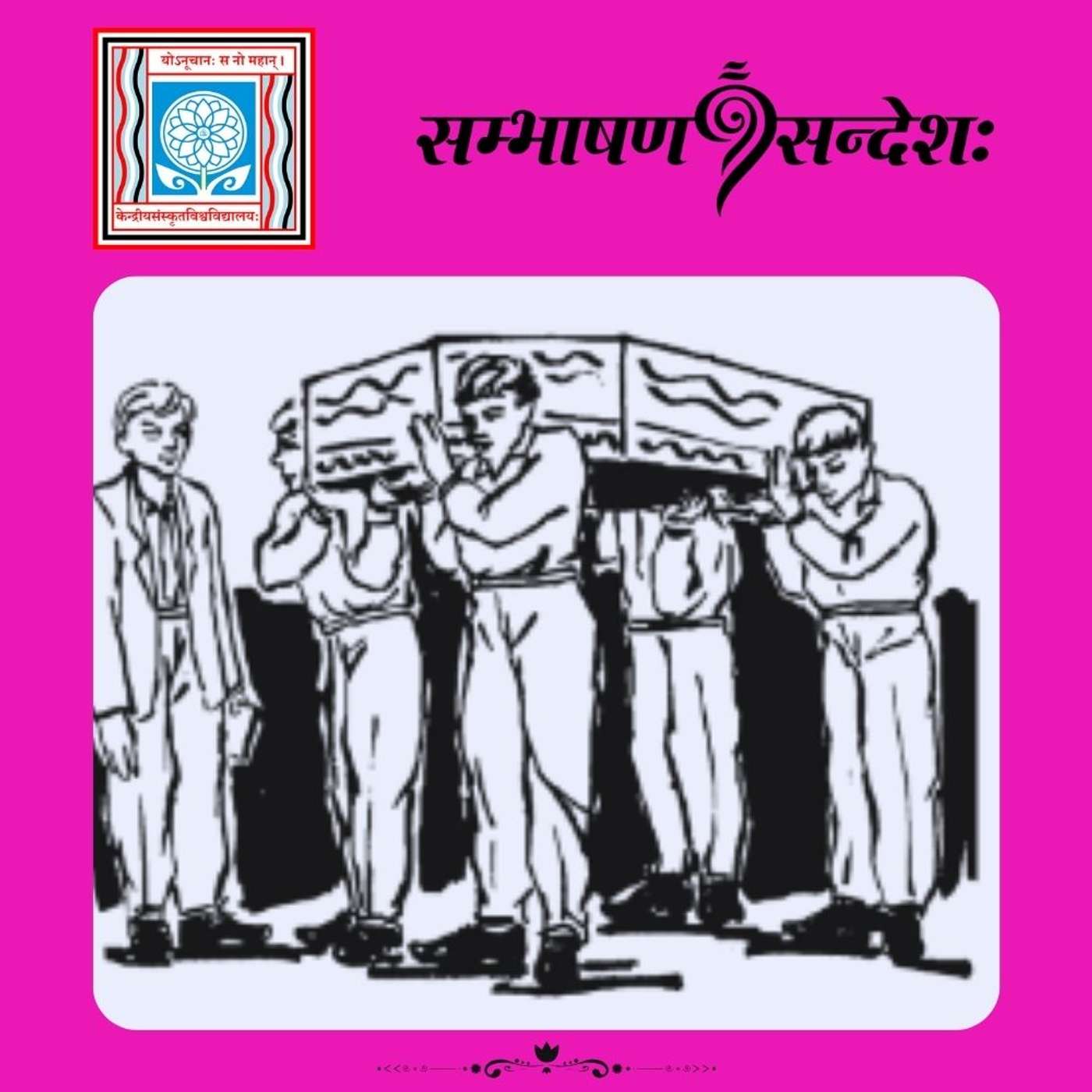
'यद्यदाचरति श्रेष्ठः तत्तदेवेतरो जनः' इत्यस्य वचनस्य उत्तमम् उदाहरणं भवितुम् अर्हति इयं कथा । कदाचित् स्काट्लेण्डदेशस्य एडिम्बरानगरस्य दण्डाधिकारी जार्ज् ड्रुमण्डः, वायुविहारसमये काञ्चन शवयात्राम् अपश्यत् । किन्तु पेटिकां परितः चतुरः जनान् विहाय अन्ये केऽपि न आसन् । कारणं तस्य दरिद्रस्य बान्धवाः, स्नेहिताः च न आसन् । अतः ड्रुमण्डः 'दरिद्राणां सेवां करोमि' इति विचिन्त्य तैः सह प्रस्थितवान् । ड्रुमण्डस्य वचनैः प्रभाविताः जनाः तम् अनुसृतवन्तः । दण्डाधिकारी कस्यचित् दरिद्रस्य शवसंस्कारार्थं गच्छन् अस्ति इति श्रुत्वा न केवलम् अहमहमिकया धावित्वा भागम् ऊढवन्तः अपि च ड्रुमण्डस्य प्रेरणया मृतस्य भार्यायाः जीवननिर्वहणार्थं धनसाहाय्यमपि कृतवन्तः ।
(“केन्द्रीयसंस्कृतविश्वविद्यालयस्य अष्टादशीयोजनान्तर्गततया एतासां कथानां ध्वनिप्रक्षेपणं क्रियते”)
This story serves as a great example of the saying, "Whatever a great person does, others follow". Once, George Drummond, a magistrate of Edinburgh, Scotland, saw a funeral procession during his evening walk. However, apart from four people carrying the coffin, no one else was present. The reason was that the deceased was poor and had no relatives or friends. Moved by compassion, Drummond decided to accompany them, thinking, "I must serve the poor". Inspired by his actions, others followed him. Upon hearing that a magistrate was attending a poor man's funeral, many rushed to join. Not only did they participate in the funeral, but, motivated by Drummond, they also provided financial assistance to the deceased’s widow for her livelihood.
अपरिवर्तनीयः विधिनियमः
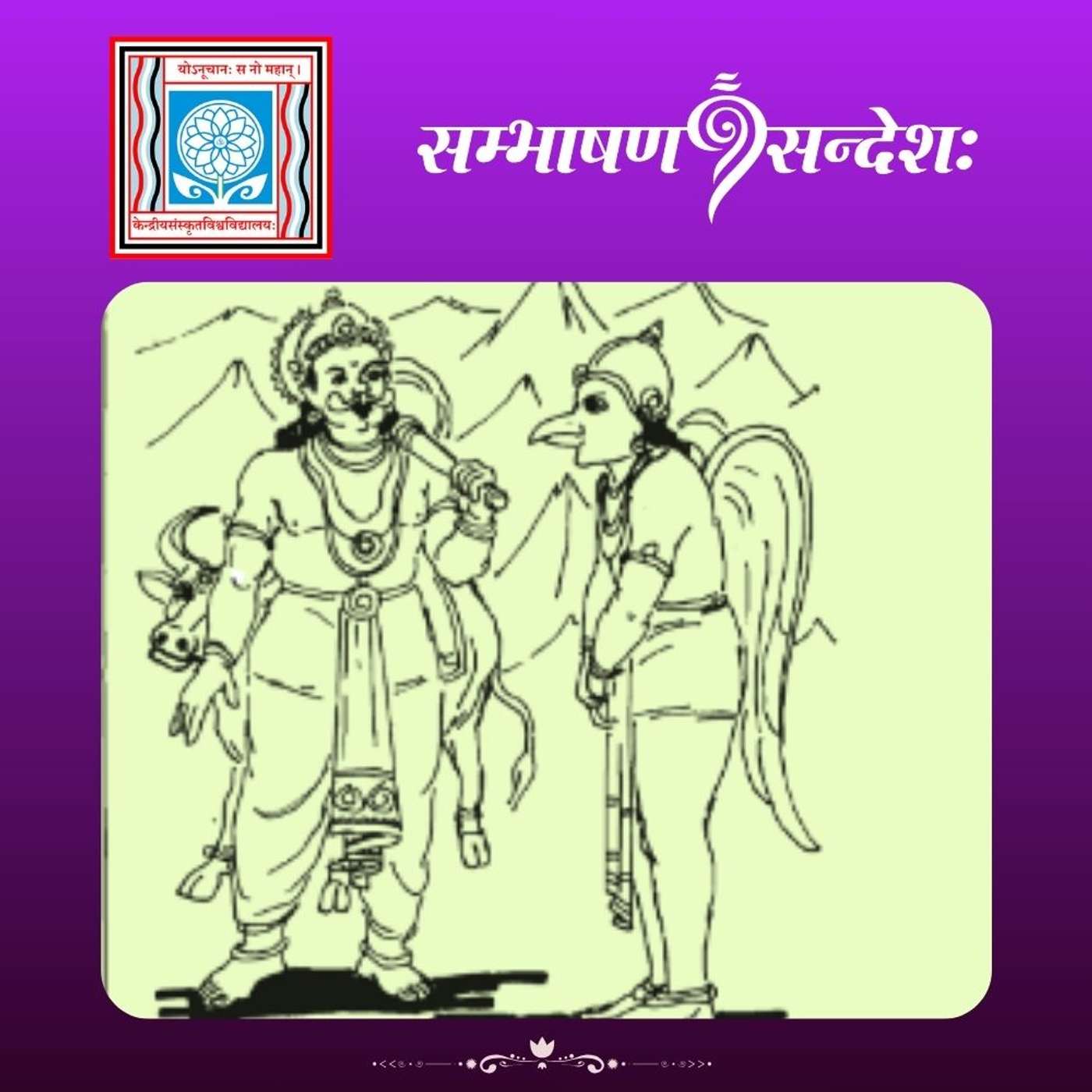
कदाचित् सर्वे देवताः स्ववाहनेन कैलासम् आगताः । गोष्ठी च आरब्धा । अत्रान्तरे बहिः महिषारूढः यमधर्मराजः पुरतः वृक्षस्य उपरि उपविष्टं कपोतं तीक्ष्णदृष्ट्या दृष्ट्वा अन्तः गतवान् । गरुडः एतत् सर्वं दृष्ट्वा कथञ्चिदपि एषः कपोतः यमधर्मराजतः रक्षणीयः इति विचिन्त्य कपोतं गृहीत्वा रामेश्वरक्षेत्रम् आनीय वटवृक्षस्य उपरि उपवेश्य वेगेन कैलासं प्रत्यागतवान् । सभातः निष्क्रामन् यमराजः रामेश्वरक्षेत्रे कपोतस्य मरणं कथं सम्पाद्यते इति जिज्ञासां यदा गरुडाय प्रकटयति तदा गरुडः प्रवृत्तं सर्वम् अकथयत् । यमदेवः अकथयत् 'विधेः नियमः न केनापि परिवर्तयितुं शक्यः' इति ।
(“केन्द्रीयसंस्कृतविश्वविद्यालयस्य अष्टादशीयोजनान्तर्गततया एतासां कथानां ध्वनिप्रक्षेपणं क्रियते”)
One day, all the gods arrived at Kailash in their respective vehicles and began a gathering. Meanwhile, outside, Yama, riding his buffalo, intensely gazed at a pigeon sitting on a tree and then entered the assembly. Seeing this, Garuda thought the pigeon must be protected from Yama. He swiftly took the pigeon to Rameshwaram, placed it on a banyan tree, and returned to Kailash. As Yama was leaving, he wondered how the pigeon’s death would occur in Rameshwaram. When he expressed this to Garuda, Garuda recounted everything. Yama then said, "No one can alter the laws of fate".
वीरतारापोरः
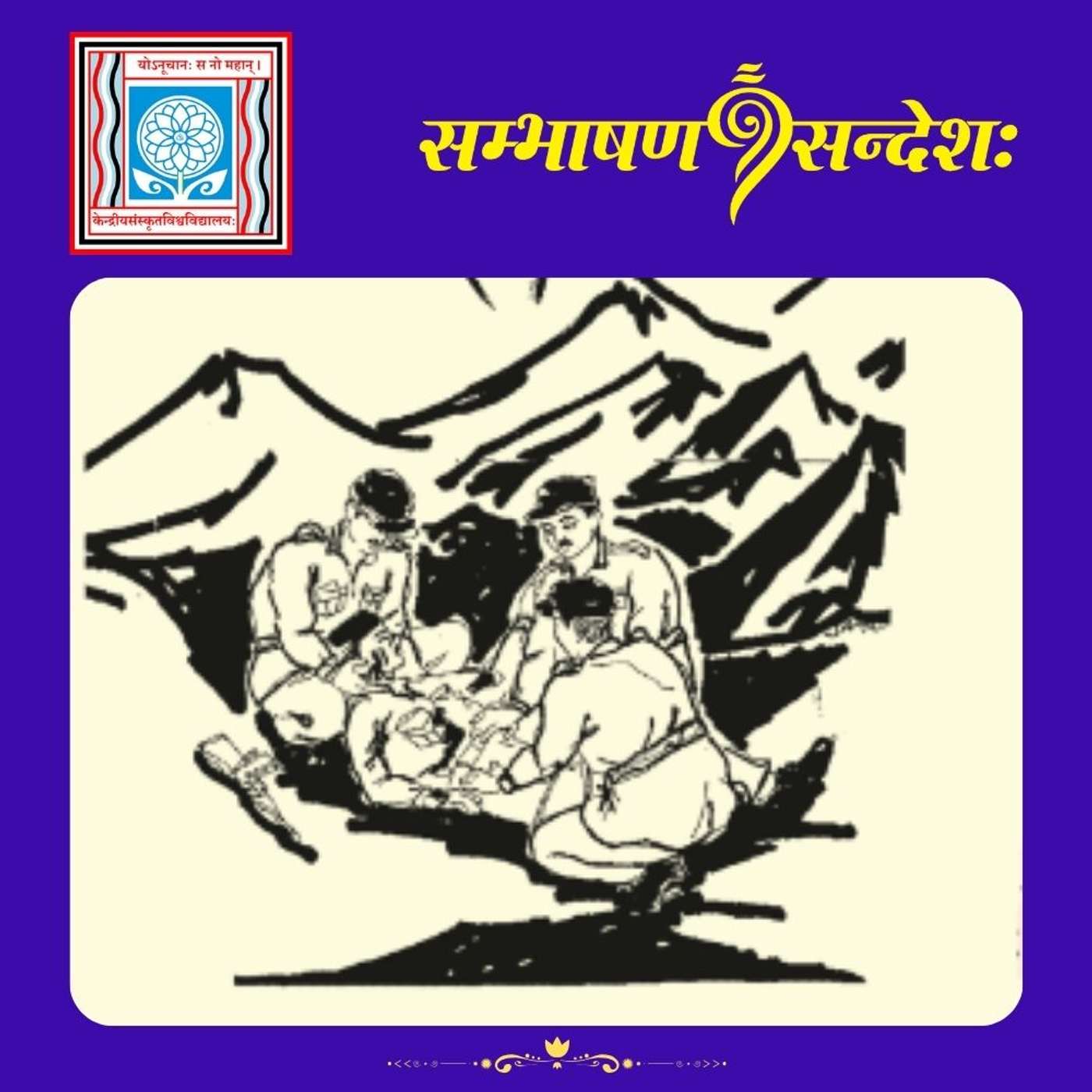
१९६५ तमे वर्षे भारतपाकिस्थानयोः मध्ये युद्धं प्रचलत् अस्ति । लेफ्टिनेण्ट तारापोरः अस्य सेनानीः आसीत् । केषाञ्चन दिनानामनन्तरं फिल्लोरनगरस्य समीपे स्थितानि शत्रुयानानि नाशितानि । पाकिस्थानस्य एका क्षिपणिः तारापोरस्य युद्धवाहनस्य विध्वंसम् अकरोत् । तारापोरः व्रणितः जातः चेदपि चिकित्साम् उपेक्ष्य अग्रे गत्वा वीरावेशेन युद्धं कृतवान् । अन्यथा गतिः नास्ति इति शत्रवः पलायनं कृतवन्तः ।
(“केन्द्रीयसंस्कृतविश्वविद्यालयस्य अष्टादशीयोजनान्तर्गततया एतासां कथानां ध्वनिप्रक्षेपणं क्रियते”)
In 1965, war was ongoing between India and Pakistan. Lieutenant Tarapore was a commander in this battle. After several days, enemy tanks near Phillaur city were destroyed. A Pakistani missile struck Tarapore’s battle tank, injuring him. Despite his wounds, he ignored medical aid and continued fighting bravely. Seeing no other option, the enemy forces fled.
चक्रवत् परिवर्तन्ते दुःखानि च सुःखानि च
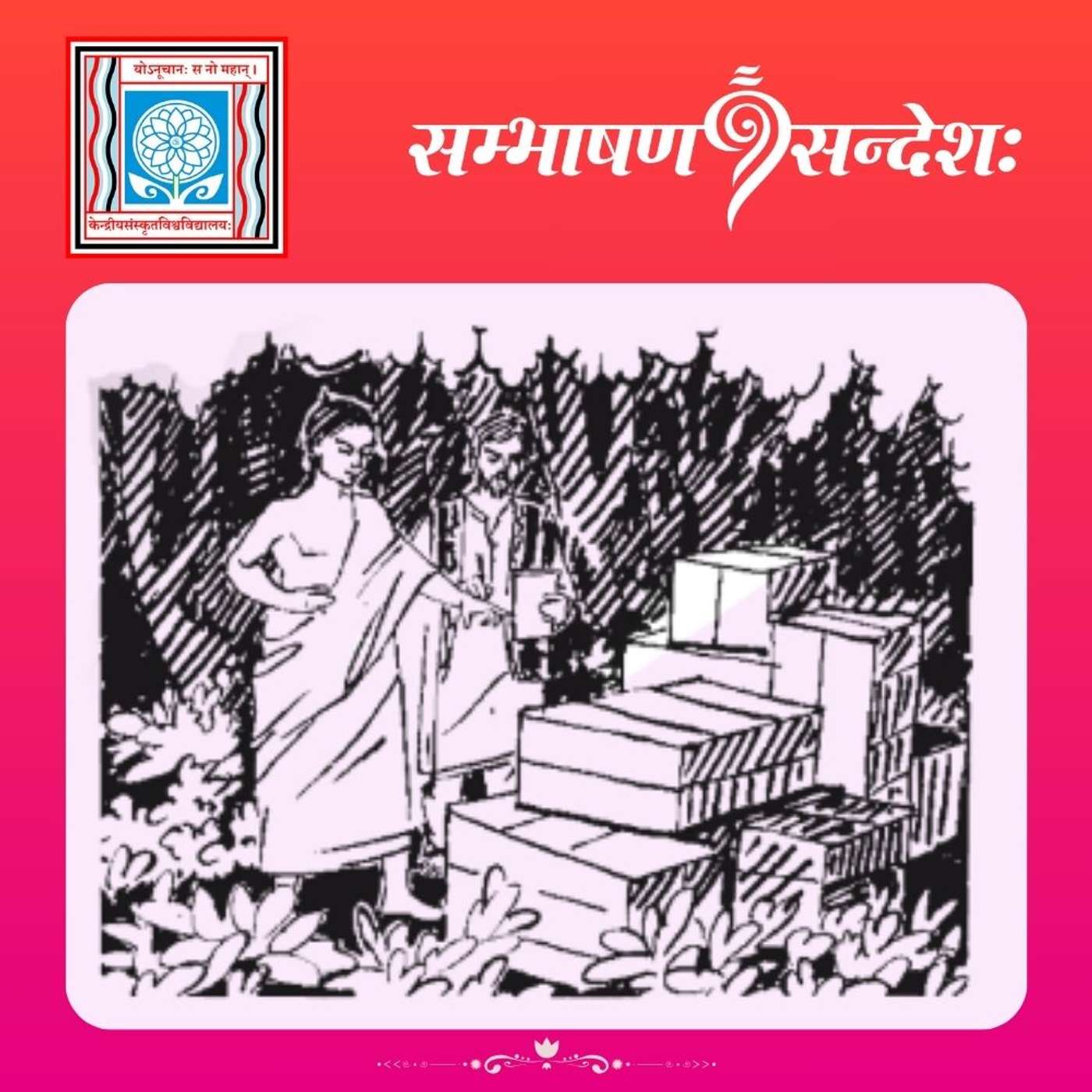
यदा वणिजः माधवस्य सुदिनानि समाप्तानि दुर्दिनानि सन्निहितानि तदा सः आर्तस्वरेण देवं प्रार्थितवान् । तदा देवः ब्राह्मणवेषं धृत्वा 'स्वस्य दुःखमेव अधिकम् इति कदापि अस्माभिः चिन्तनं न करणीयम् । अन्येषाम् इतोऽप्यधिकानि दुःखानि भवन्ति एव' इति केनचित् निर्दर्शनेन बोधितवान् । ततः सः धैर्येण एव कष्टानि सोढवान् । अन्ते च सुखं प्राप्तवान् ।
(“केन्द्रीयसंस्कृतविश्वविद्यालयस्य अष्टादशीयोजनान्तर्गततया एतासां कथानां ध्वनिप्रक्षेपणं क्रियते”)
When the merchant Madhava's good days ended and difficult times approached, he prayed to God in distress. Then, God, disguised as a Brahmin, advised him, "One should never think that their suffering is the greatest. There are always others facing even greater hardships". With this realization, Madhava endured his troubles with patience. In the end, he attained happiness.
न्यायस्य महिमा
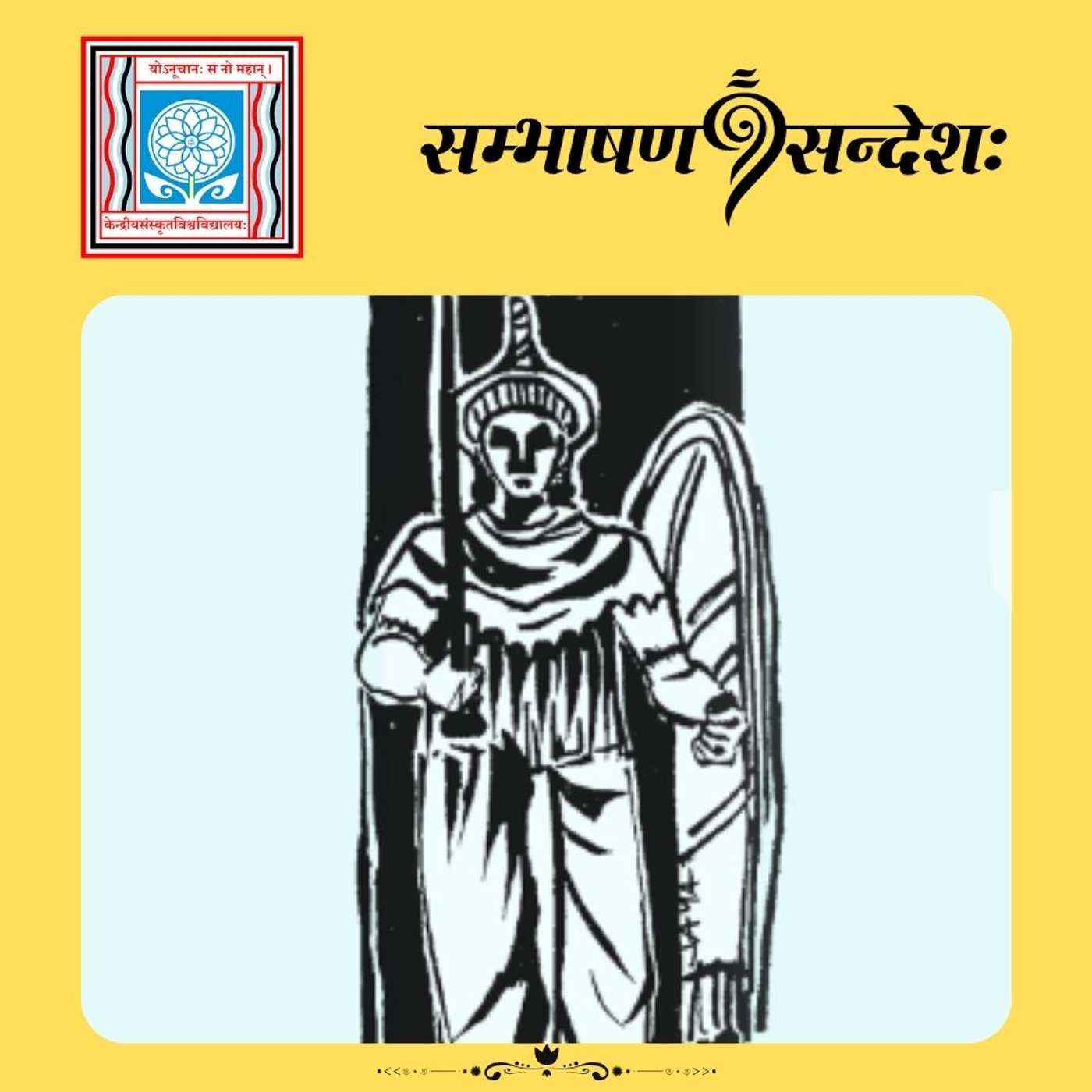
ग्रीक्-देशस्य स्पार्टानगरे एकं देवीमन्दिरम् आसीत् । देव्याः विग्रहे एकः खड्गः लम्बमानः असीत् । सः खड्गः न्यायनिर्णये सहकरोति स्म । विवादः उत्पन्ने वादिनः विवादिनः च मन्दिरं गत्वा खड्गस्य अधः हस्तं स्थापयन्ति । तदा खड्गः स्वयमेव अधः पतति येन यः अन्याय्यं कृतवान् भवति तस्य हस्तः कर्तितः भवति । अल्विनः नाम कश्चन कृषकः काञ्चित् विधवामहिलां न्यासरूपेण स्थापितानां सुवर्णनाणकानां विषये वञ्चयति । न्याय्यार्थं मदिरं गत्वा खड्गस्य अधः हस्तं स्थापितवान् अल्विनः । किन्तु खड्गः न विचलितः । कारणं ज्ञातव्यं वा ? अल्विनस्य कृते दण्डनं लभ्येत वा ? कथां श्रुत्वा जानन्तु ।
(“केन्द्रीयसंस्कृतविश्वविद्यालयस्य अष्टादशीयोजनान्तर्गततया एतासां कथानां ध्वनिप्रक्षेपणं क्रियते”)
In the Greek city of Sparta, there was a temple dedicated to a goddess. A sword hung from the deity’s statue, which played a role in delivering justice. Whenever a dispute arose, the litigants would go to the temple and place their hands beneath the sword. If someone had committed an injustice, the sword would fall and sever their hand. A farmer named Alvin deceived a widowed woman regarding gold coins entrusted to him for safekeeping. Seeking justice, he went to the temple and placed his hand beneath the sword. However, the sword did not move. Why did this happen? Would Alvin receive punishment? Listen to the full story to find out!
बुद्धिमान् शशः
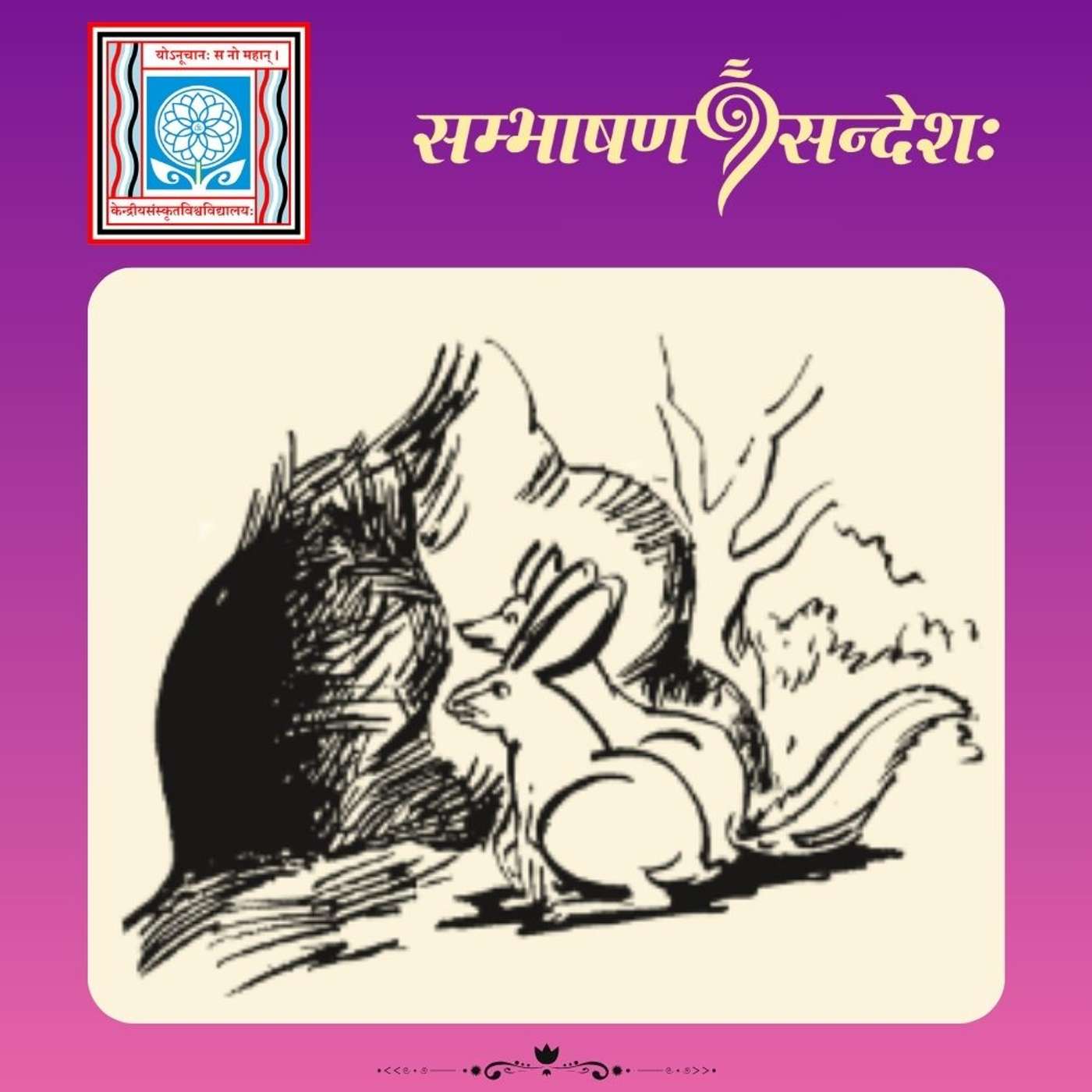
कदाचित् आहारान्वेषणं कुर्वता शृगालेन एकः शशः दृष्टः । शृगालस्य आगमनं दृष्ट्वा शशः 'कथमपि एतं वञ्चयित्वा आत्मानं संरक्षामि' इति अचिन्तयत् । यदा शृगालः समीपम् आगतवान् तदा शशः 'अन्यः एकः विशिष्टः शृगालः एकस्यां गुहायां वसति । सः शृगालं विना अन्यं प्राणिनं न खादति एव' इति अवदत् । तत् श्रुत्वा तं द्रष्टुं गुहां प्रति प्रस्थितवन्तौ । शशः सिंहस्य गुहायाम् अन्तः शृगालं प्रेषितवान् । अनन्तरं किं जातम् इति वक्तव्यं नास्ति खलु ?
(“केन्द्रीयसंस्कृतविश्वविद्यालयस्य अष्टादशीयोजनान्तर्गततया एतासां कथानां ध्वनिप्रक्षेपणं क्रियते”)
While searching for food, a fox saw a rabbit. Seeing the fox approaching, the rabbit thought, "I must somehow deceive him and save myself". When the fox came near, the rabbit said, "A special fox lives in a cave nearby. He does not eat any creature except those brought by another fox". Hearing this, they both set off to see him. The rabbit led the fox into a lion's cave. What happened next needs no explanation, right?
मध्वपतिः
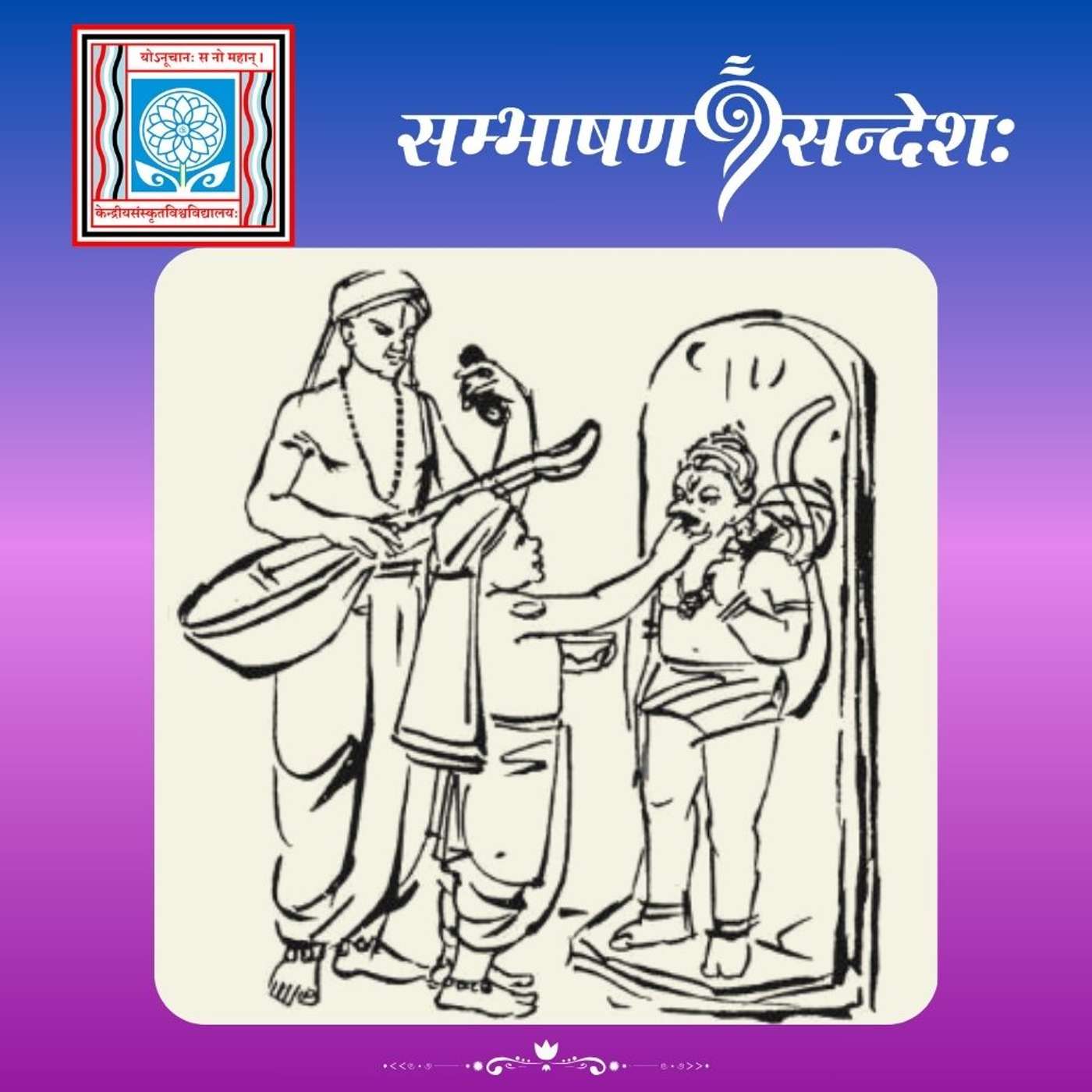
कर्णाटकसङ्गीतक्षेत्रे पुरन्दरदासः अतीव प्रसिद्धः । कदाचित् तेन दिनचतुष्टयं नगरान्तरं गन्तव्यम् आपतितम् । अतः तस्य चतुर्थं पुत्रं लघुबालं मध्वपतिं मारुतेः पूजाकार्यं करोतु इत्युक्तवान् । परेद्यवि नैवेद्यविधेः अनन्तरमपि मारुतिः नैवेद्यं न कृतवान् इत्यतः भक्त्या नैवेद्यं स्वीकर्तुं प्रार्थितवान् । मध्वपतेः हठं दृष्ट्वा मारुतिः मुखम् उद्घाटितवान् । मध्वपतिः स्वल्पं स्वल्पं नैवेद्यं मुखे क्षिप्तवान् । मारुतिः अपि शनैः खादितवान् । गृहागतेन पुरन्दरेण ज्ञातं यत् मध्वपतिः नैवेद्यं मारुतिं खादयति इति । तत् साक्षात् दृष्ट्वा पुरन्दरदासस्य नेत्राभ्याम् अश्रूणि अगलन् । सः प्रीत्या पुत्रम् आलिङ्गितवान् ।
(“केन्द्रीयसंस्कृतविश्वविद्यालयस्य अष्टादशीयोजनान्तर्गततया एतासां कथानां ध्वनिप्रक्षेपणं क्रियते”)
Purandaradasa is highly renowned in Carnatic music. Once, he had to travel to another city for four days. Before leaving, he instructed his youngest son, Madhvapati, to offer worship to Lord Hanuman. The next day, even after the ritual offering, Hanuman did not take the food. Out of devotion, Madhvapati insisted that Hanuman accept it. Seeing the boy’s determination, Hanuman opened his mouth, and Madhvapati slowly fed him. Hanuman gradually ate the offering. When Purandaradasa returned home, he discovered that Madhvapati had fed Hanuman. Witnessing this divine event, tears streamed from his eyes, and he embraced his son with joy.
शिवाजेः औदार्यम्

बर्हानपुरे दरिद्रः केशवशास्त्री पुत्रस्य चिकित्सार्थं धनम् अपेक्षते इति देवं प्रार्थयमाणः आसीत् । तदा एव देवालयात् बहिः कोलाहलं श्रुत्वा ज्ञातवान् यत् आगरादुर्गात् पलायितः शिवाजिमहाराजः, चत्वारः अनुचराः च सन्ति इति । सः अचिन्तयत् यत् 'एनं विषयं यवनाधिकारिणं सूचयामि । तदा यत् पारितोषिकं लभ्यते तेन मम पुत्रं रक्षामि' इति । एतत् सर्वं गृहजनेभ्यः उक्त्वा यदा गृहतः प्रस्थितः तदा तस्य स्नुषा 'हिन्दूनां रक्षणार्थं कथमपि शिवाजिः रक्षणीयः' इति विचिन्त्य, एकाकिनी धावित्वा सर्वं शिवाजिं निवेद्य गृहमागतवती । यदा यवनाः आगताः तदा देवालये कोऽपि न आसीत् । किन्तु शतसुवर्णनाणकैः पूर्णं स्यूतं दृष्ट्वा केशवशास्त्री सन्तुष्टः, तथापि शिवाजेः औदार्यं ज्ञात्वा नितरां लज्जितः अभवत् ।
(“केन्द्रीयसंस्कृतविश्वविद्यालयस्य अष्टादशीयोजनान्तर्गततया एतासां कथानां ध्वनिप्रक्षेपणं क्रियते”)
In Burhanpur, the poor Keshav Shastri prayed for money to treat his son. Hearing a commotion outside the temple, he learned that Shivaji Maharaj had escaped from Agra Fort with four companions. Thinking of informing the Mughal authorities to receive a reward, he shared his plan with his family. However, his daughter-in-law, determined to protect Shivaji, ran alone to warn him and returned home. When the Mughals arrived, Shivaji was gone, but Keshava found a bag filled with a hundred gold coins. Keshav Shastri felt satisfied, yet upon realizing Shivaji’s generosity, he was deeply ashamed.
ज्ञानतो ज्येष्ठत्वम्
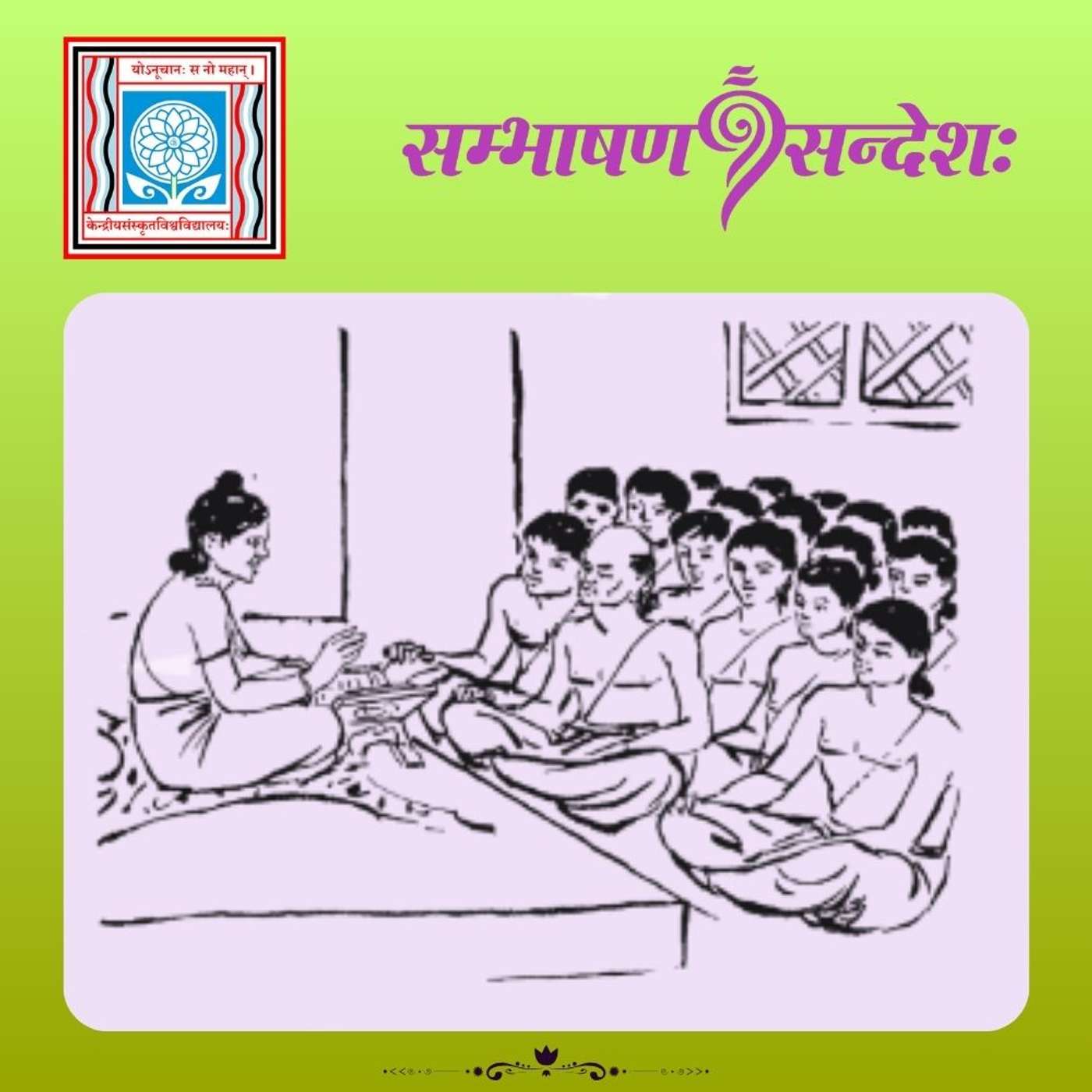
एकदा अङ्गिरसस्य पुत्रस्य कवेः समीपं तस्य मातुलः पितृव्यः इत्यादयः सर्वे वृद्धाः गत्वा 'भवान् तु अस्माकं पुत्रः इव । अस्माकं वेदाध्ययनं कारयतु' इति अवदन् । ततः कविना वृद्धवर्गाय वेदाध्यापनम् आरब्धम् । कदाचित् पाठनावसरे कविना उक्तम् 'हे पुत्राः! मह्यं जलम् आनयन्तु' इति । तं सम्बोधनं श्रुत्वा खिन्नाः वृद्धजनाः देवनां समीपं गतवन्तः । देवाः अवदन् 'अज्ञानी मनुष्यः बालः एव । वेदज्ञः एव पिता इति शास्त्रं निर्दिशति । 'विप्राणां ज्ञानतो ज्येष्ठत्वम्' इति वचनानुसारं ज्ञानस्य कारणतः भवदपेक्षया ज्येष्ठः अस्ति कविः एव । अतः तस्य व्यवहारः उचितः' इति ।
(“केन्द्रीयसंस्कृतविश्वविद्यालयस्य अष्टादशीयोजनान्तर्गततया एतासां कथानां ध्वनिप्रक्षेपणं क्रियते”)
Once, the elderly relatives of Kavi, the son of Angiras, approached him and said, "You are like a son to us. Please teach us the Vedas". Accepting their request, Kavi began instructing them. One day, during a lesson, Kavi addressed them as 'sons' and asked them to bring him water. Hearing this, the elders felt hurt and sought guidance from the gods. The gods explained, "An ignorant person is like a child, while a learned one is considered a father. The scriptures declare that wisdom determines seniority—'Among Brahmins, knowledge makes one superior.' Since Kavi possesses greater knowledge than you, his behavior is appropriate".
त्रयः पाषाणखण्डाः
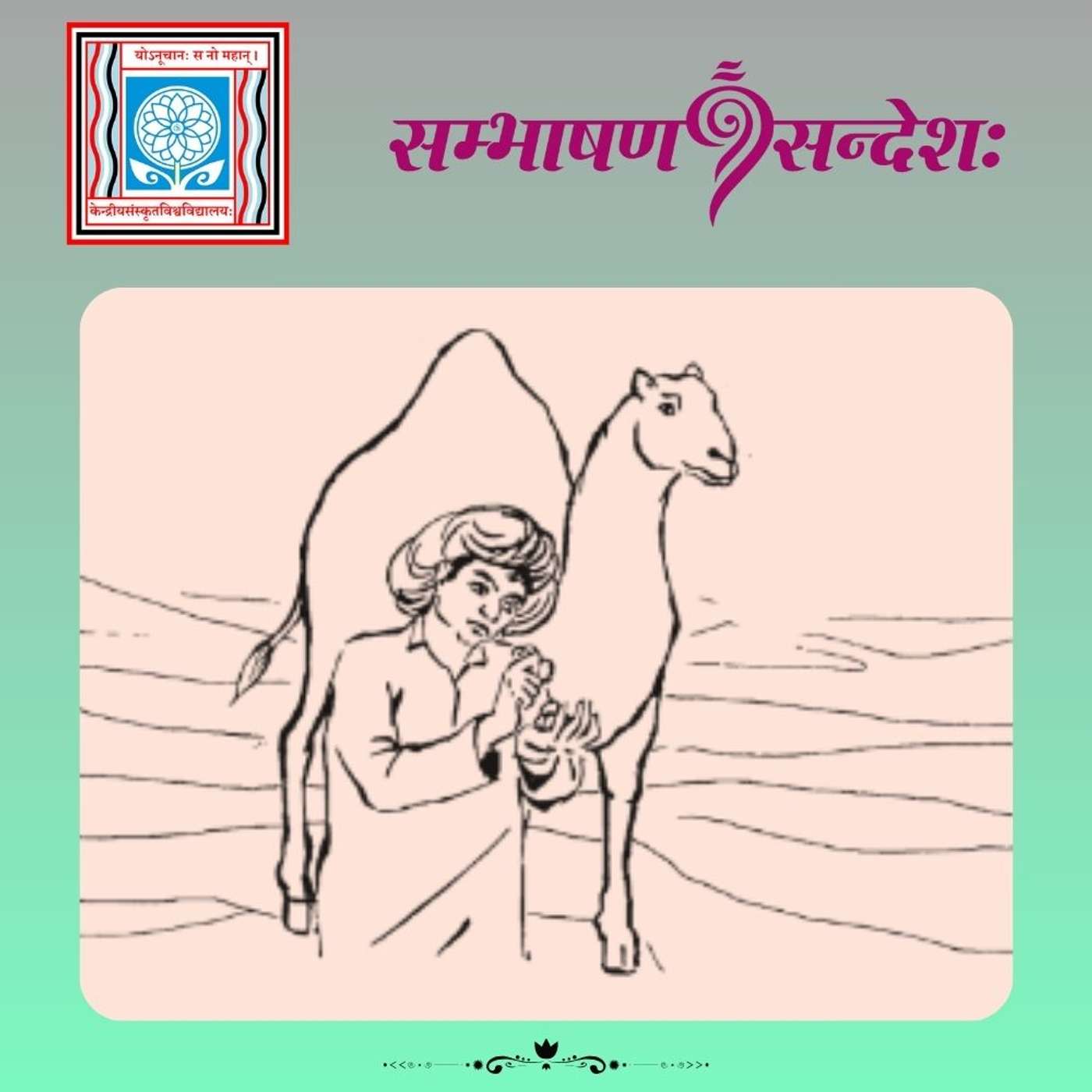
कश्चन पथिकः मरुप्रदेशे सञ्चरन् आसीत् । रात्रौ कश्चित् ध्वनिः श्रुतः 'अत्र पतितान् पाषणखण्डान् चिनोतु । श्वः ते सुवर्णमयाः भवेयुः' इति । किन्तु पथिकस्य विश्वासः न आसीत् । तथापि तेन त्रयः पाषाणखण्डाः स्वीकृताः । अनन्तरदिने त्रयः अपि पाषाणखण्डाः सुवर्णरूपेण परिवृत्ताः आसन् । पथिकः हर्षोत्फुल्लः अभवत् । किन्तु द्वितीयक्षणे 'कुतो मया बहवः पाषाणखण्डाः न चिताः?’ इति चिन्तयन् हतोत्साहः दु:खितश्च अभवत् । तस्य समीपे अमूल्याः त्रयः पाषाणखण्डाः सन्ति चेदपि किञ्चिदपि सुखम् अनुभवितुं न शक्तः जातः सः ।
(“केन्द्रीयसंस्कृतविश्वविद्यालयस्य अष्टादशीयोजनान्तर्गततया एतासां कथानां ध्वनिप्रक्षेपणं क्रियते”)
A traveler was wandering through a desert when, at night, he heard a voice saying, "Pick up the fallen stones here. Tomorrow, they will turn into gold". Doubtful but curious, he picked up only three stones. The next morning, he was overjoyed to see that they had indeed turned into gold. However, in the very next moment, he thought, "Why didn’t I collect more?" This regret overwhelmed his happiness, leaving him disheartened and sorrowful, despite having three priceless gold pieces in his possession.
अखण्डः विश्वासः
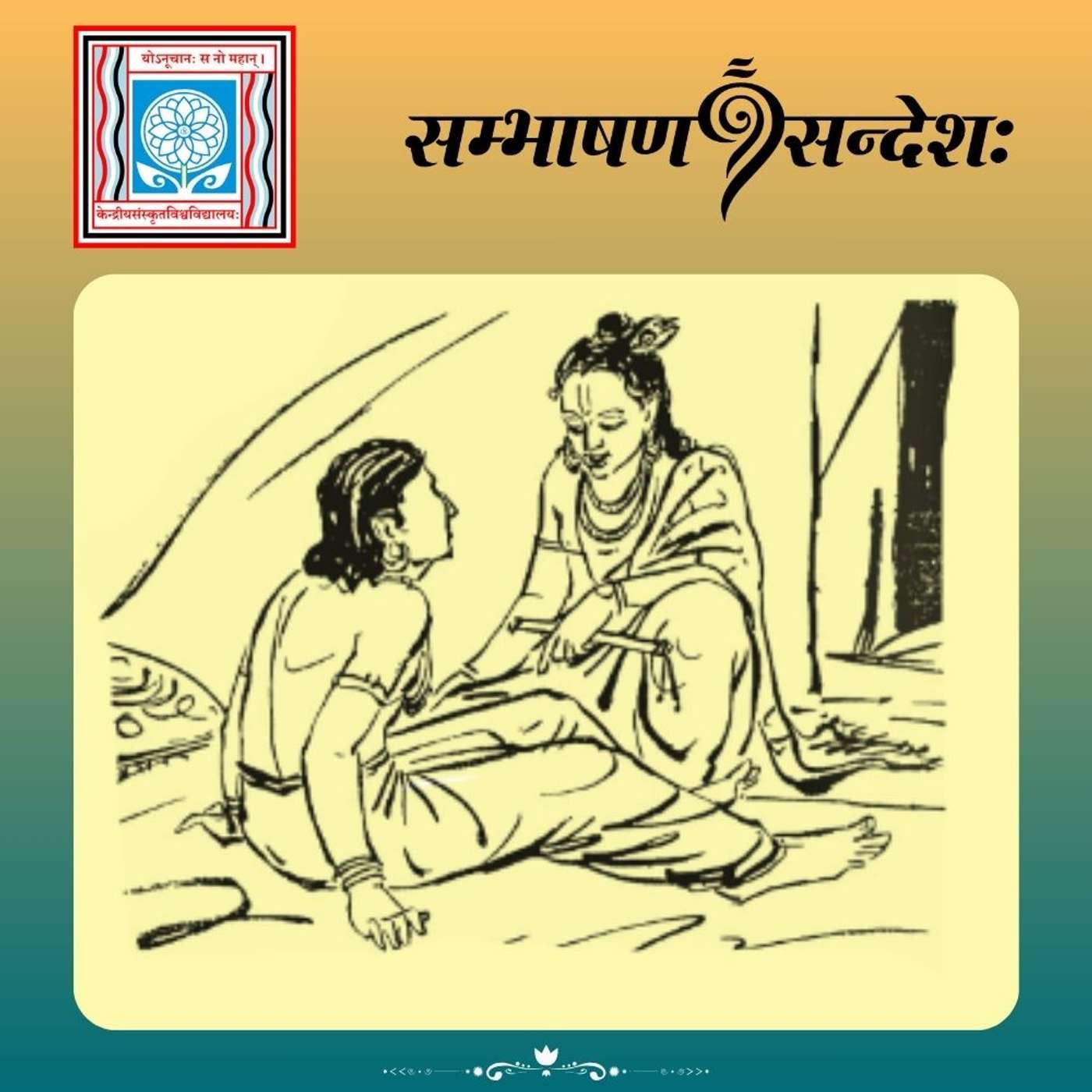
कुरुक्षेत्रस्य युद्धे कदाचित् भीष्मः प्रतिज्ञातवान् 'अहं श्वः अर्जुनं मारयिष्यामि अथवा तेन पराजितः वा भविष्यामि' इति । तां प्रतिज्ञां श्रुत्वा पाण्डवपक्षे सर्वेऽपि भीताः चिन्तिताः च अभवन् । भगवान् श्रीकृष्णः अपि चिन्तावशात् रात्रौ निद्रां न प्राप्तवान् । सः अर्जुनस्य सेनाशिबिरं गतवान् । अर्जुनः तु गाढनिद्रायां मग्नः आसीत् । साश्चर्यं कृष्णः तम् उत्थाप्य प्रतिज्ञायाः विषये चिन्तितः नास्ति वा इति यदा अपृच्छत् तदा अर्जुनः अवदत् 'स्वस्य भक्तस्य अर्जुनस्य रक्षणभारः भगवतः भवतः एव । मम चिन्ता का अत्र?’ इति । अर्जुनस्य एतादृशं दृढं विश्वासं दृष्ट्वा एव श्रीकृष्णः पार्थसारथिः अभवत् ।
(“केन्द्रीयसंस्कृतविश्वविद्यालयस्य अष्टादशीयोजनान्तर्गततया एतासां कथानां ध्वनिप्रक्षेपणं क्रियते”)
During the Kurukshetra war, Bhishma vowed, "Tomorrow, I will either kill Arjuna or be defeated by him". Hearing this, the Pandavas were terrified, and even Krishna could not sleep due to worry. Krishna went to Arjuna’s camp, but found him in deep sleep. Surprised, Krishna woke him up and asked if he was not concerned about Bhishma’s vow. Arjuna calmly replied, "The responsibility of protecting me is yours, my Lord. Why should I worry?" Seeing Arjuna’s unwavering faith, Krishna became his charioteer, guiding him throughout the war.
जीवनपथः
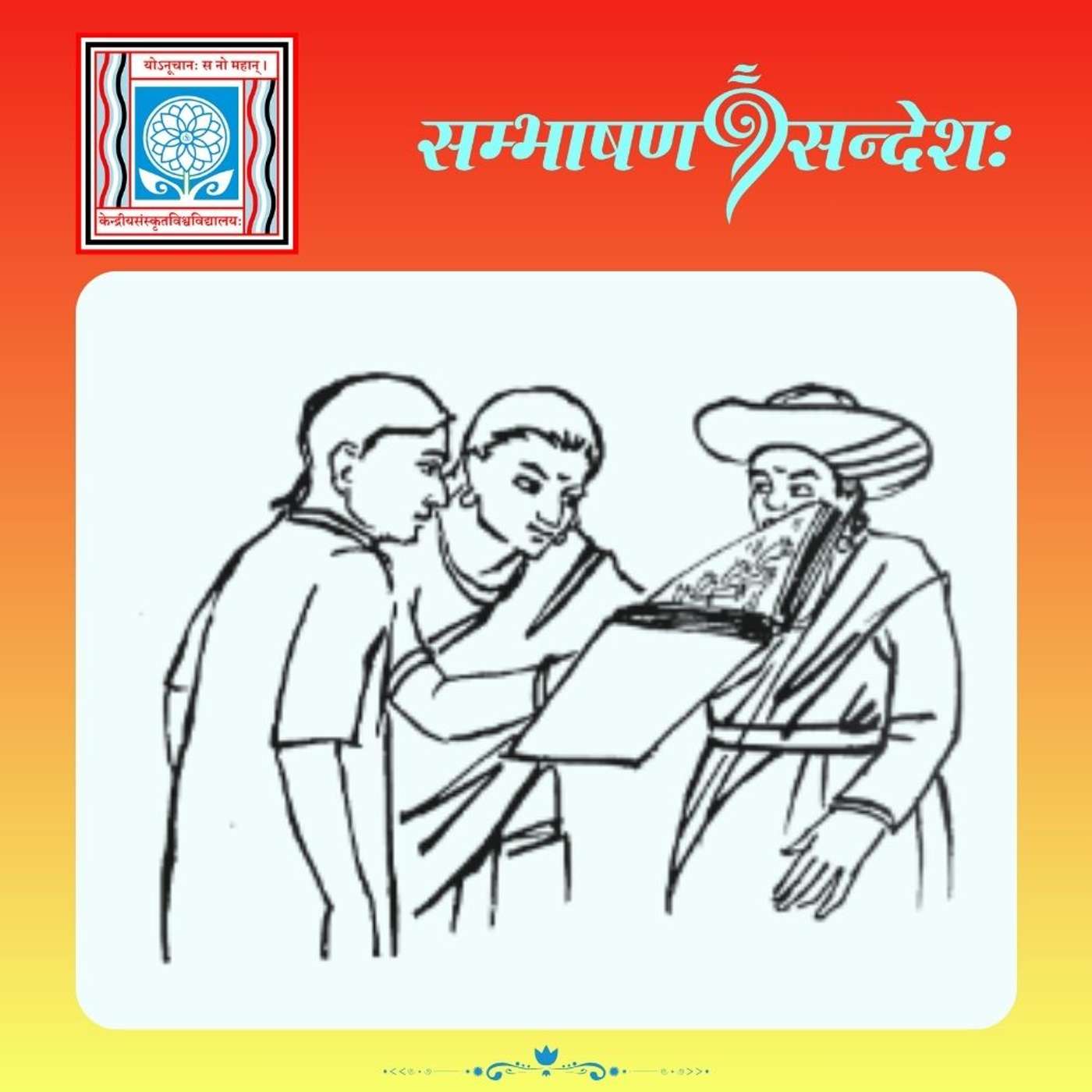
कदाचित् कश्चन मनुष्यः बहुभिः दुःखैः पीडितः सन् ईश्वरसमीपं गत्वा उच्चैः आक्रोशम् कृतवान् । तदा ईश्वरः चित्रगुप्तम् आहूय 'भवतः पुस्तकात् एतस्य जीवनपथप्रदर्शकं चित्रं दर्शयतु' इति अवदत् । यत्र यत्र तस्य मनुष्यस्य पदचिह्नानि आसन् तत्र तत्र ईश्वरस्यापि पदचिह्नानि आसन् । कदाचित् यदा सः मनुष्यः दुःखपीडितः सन् चलितुमपि असमर्थः जातः, तदा ईश्वरः स्वस्य स्कन्धयोः तम् आरोप्य चलितवान् इति ज्ञात्वा मनुष्यः भृशं लज्जाम् अनुभूय ईश्वरं क्षमां याचितवान् ।
(“केन्द्रीयसंस्कृतविश्वविद्यालयस्य अष्टादशीयोजनान्तर्गततया एतासां कथानां ध्वनिप्रक्षेपणं क्रियते”)
A man, overwhelmed by suffering, went to God and cried out in despair. In response, God summoned Chitragupta and asked him to show the path of the man's life from his records. In the depiction, wherever the man's footprints appeared, God's footprints were also present beside them. However, during the times when the man was too burdened to walk, there were no footprints of his own—only God's. Realizing that during his most difficult moments, God had carried him on His shoulders, the man felt deep shame and asked for forgiveness.
महादाता

कश्चित् महाराजः धर्मबुद्धिः सुशीलः च आसीत् । तस्य प्रासादे सहस्राधिकाः जनाः भोजनं कृत्वा सन्तृप्त्या गच्छन्ति स्म । कदाचित् तस्य मनसि स्वस्य दानस्य विषये अहङ्कारः जातः । भोजनं कृत्वा आगच्छन्तं प्रत्येकं जनम् अपृच्छत् 'आतृप्ति भोजनं कृतं वा ? अस्य कार्यस्य कृते मां स्मरति वा ?’ इति । सर्वे आम्, स्मरामः इति अवदन् । किन्तु कश्चित् संन्यासी अवदत् 'अहम् इतोSपि महत्तरं दानं कृतवन्तं प्रथमं स्मृत्वा अनन्तरं भवन्तं स्मरिष्यामि' इति । कः सः? इति महाराजेन पृष्टे संन्यासी अवदत् 'अस्माकं शरीरं, प्राणाः, वायुः, सस्यानि इत्यादीनि भगवान् दानरूपेण अस्मभ्यं दत्तवान् अस्ति । तस्य स्मरणमेव आद्यं कर्तव्यम्' इति । तदा महाराजस्य अहङ्कारः नष्टः जातः । सः संन्यासिनं क्षमां याचितवान् ।
(“केन्द्रीयसंस्कृतविश्वविद्यालयस्य अष्टादशीयोजनान्तर्गततया एतासां कथानां ध्वनिप्रक्षेपणं क्रियते”)
A certain great king was known for his righteousness and virtue. In his palace, thousands of people were fed daily. One day, pride arose in his heart regarding his generosity. He began asking each person after their meal, "Are you satisfied? Will you remember me for this deed?" Everyone replied, "Yes, we will remember you". However, a sage responded, "I will first remember the one who has given an even greater gift, and only then will I remember you". When the king asked who that was, the sage explained, "God has given us our body, life, air, crops, and everything as a gift. Remembering Him must come first". Hearing this, the king's pride vanished, and he humbly sought the sage’s forgiveness.
भीमभक्तिः
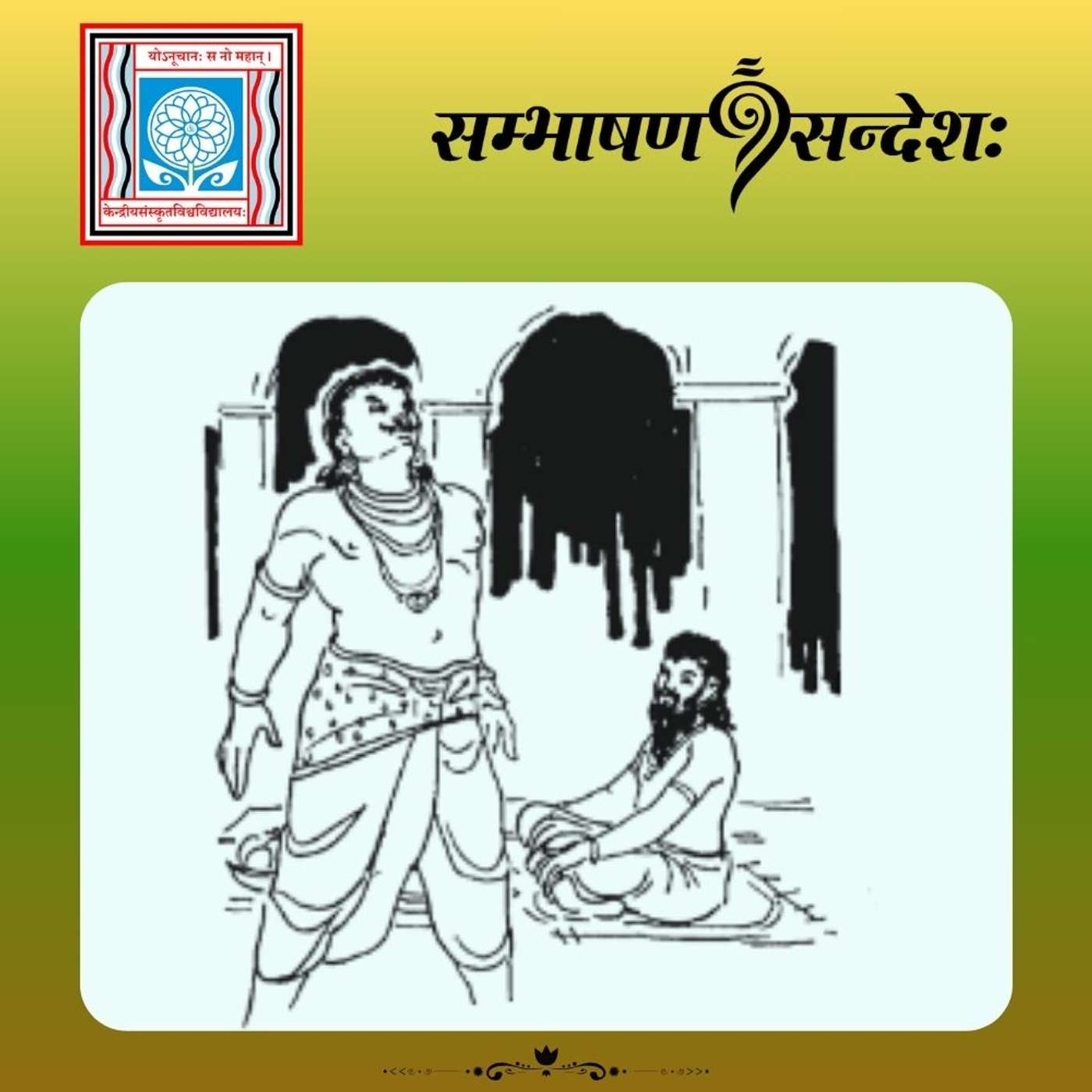
युधिष्ठिरः धनुर्मासे प्रतिदिनं शिवपूजां करोति स्म । 'परेद्युः समाप्तिदिनम् । अतः श्रीकृष्णेन सह भोजनं कर्तुम् इच्छामि' इति यदा युधिष्ठिरः अवदत् तदा सर्वे चिन्ताग्रस्ताः आसन् । अल्पेन समयेन कथं गमनागमनं शक्यम् इति । तदा भीमसेनः आगत्य 'श्वः सूर्योदयात् पूर्वम् अहं कृष्णम् अत्र आनेष्यामि' इति अवदत् । परेद्यवि भीमः स्नानादिकं कृत्वा पाकशालां गत्वा भोजनस्य सिद्धतां अकरोत् । तस्य पुरतः स्थित्वा द्वारकाभिमुखः सन् श्रीकृष्णं ध्यायन् स्वीयां गदाम् आकाशे क्षिप्त्वा अवदत् 'एषा गदा यावत् मम शिरसः उपरि न पतिष्यति तावता भवता अत्र उपस्थितेन भवितव्यम्' इति । तत्क्षणमेव श्रीकृष्णः प्रकटः भूत्वा भीमम् आलिङ्गितवान् ।
(“केन्द्रीयसंस्कृतविश्वविद्यालयस्य अष्टादशीयोजनान्तर्गततया एतासां कथानां ध्वनिप्रक्षेपणं क्रियते”)
During Dhanurmasa, Yudhishthira worshipped Lord Shiva daily. One day, he expressed his wish to have a meal with Krishna on the final day, leaving everyone worried about the impossible journey to Dwarka. Bhima then declared, "Before sunrise tomorrow, I will bring Krishna here". The next day, after completing his rituals, Bhima ensured the meal was ready. Facing Dwarka, he meditated on Krishna, threw his mace into the sky, and proclaimed, "Until this mace falls on my head, you must appear here!" Instantly, Krishna manifested, embraced Bhima, and fulfilled his wish.
गुरुसन्निधिः
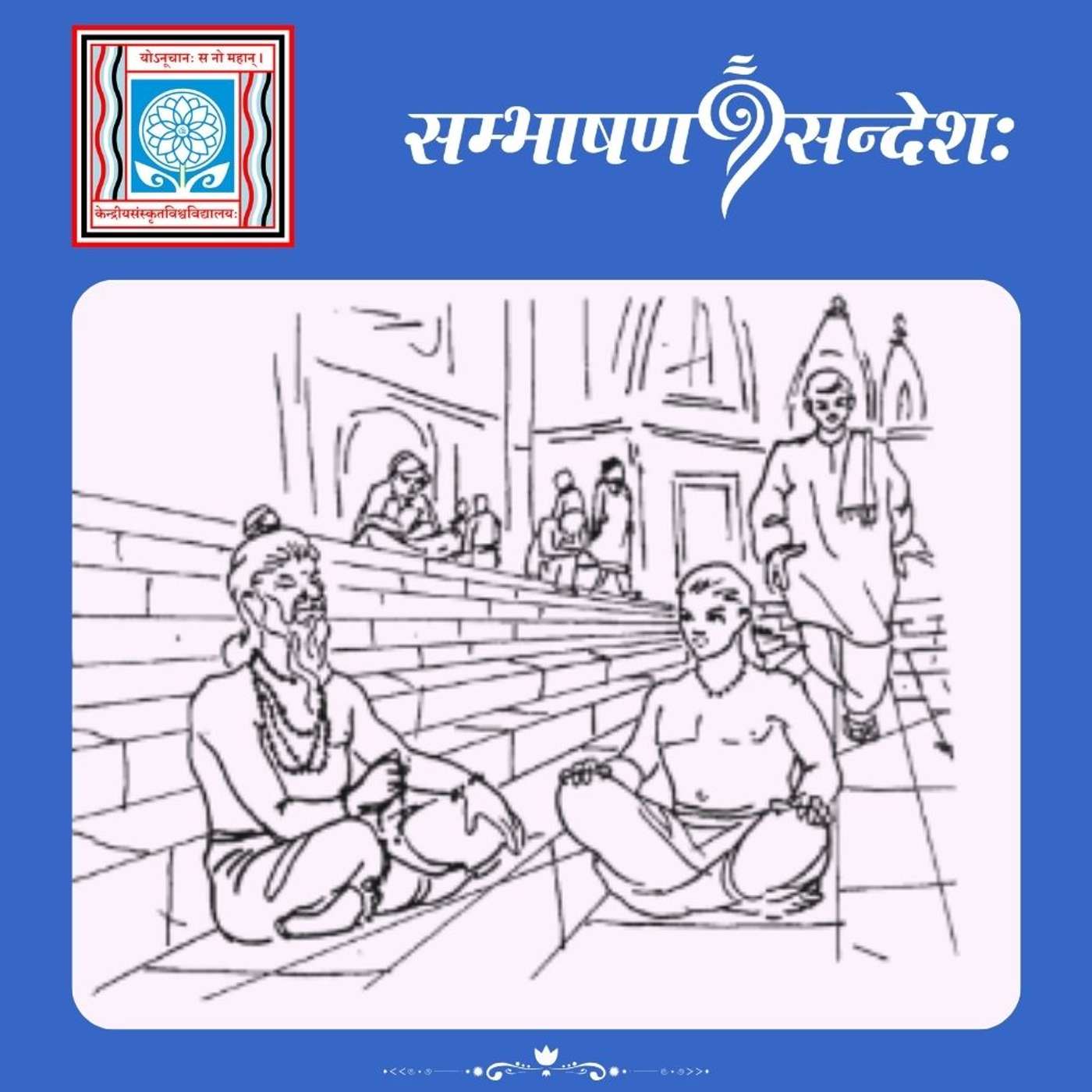
कदाचित् कश्चन युवकः गृहं त्यक्त्वा अन्यत्र गतवान् । मातापितरौ पुत्रस्य अन्वेषणार्थं सर्वविधान् प्रयत्नान् कृतवन्तौ । दश वर्षाणि अतीतानि । कदाचित् पिता काशीयात्राम् अगच्छत् । तत्र गङ्गातटे कस्यचन साधोः समीपे उपविश्य पठन्तं कञ्चित् तरुणं दृष्ट्वा एषः स्वस्यैव पुत्रः इति निश्चित्य तम् आलङ्गितुं तस्य समीपं धावितवान् । किन्तु पुत्रः तं वारयन् 'क्षणं प्रतीक्षताम्' इति यदा अवदत् तदा क्रुद्धः पिता तं गुरुं निन्दितवान् । अनन्तरं पुत्रस्य वचनानि श्रुत्वा गुरुसन्निधेः महत्त्वं च ज्ञात्वा पिता मौनम् आश्रित्वान् ।
(“केन्द्रीयसंस्कृतविश्वविद्यालयस्य अष्टादशीयोजनान्तर्गततया एतासां कथानां ध्वनिप्रक्षेपणं क्रियते”)
A young man once left his home and went elsewhere. His parents searched for him tirelessly, but ten years passed without success. One day, his father traveled to Kashi. On the banks of the Ganges, he saw a young man studying near a sage and immediately recognized him as his own son. Overcome with emotion, he ran to embrace him. However, the son raised his hand to stop him and said, "Please wait a moment". Angered by this, the father criticized the sage, blaming him for keeping his son away. But after listening to his son’s words and understanding the importance of the guru’s presence, the father realized his mistake and fell silent in respect.
निष्ठा
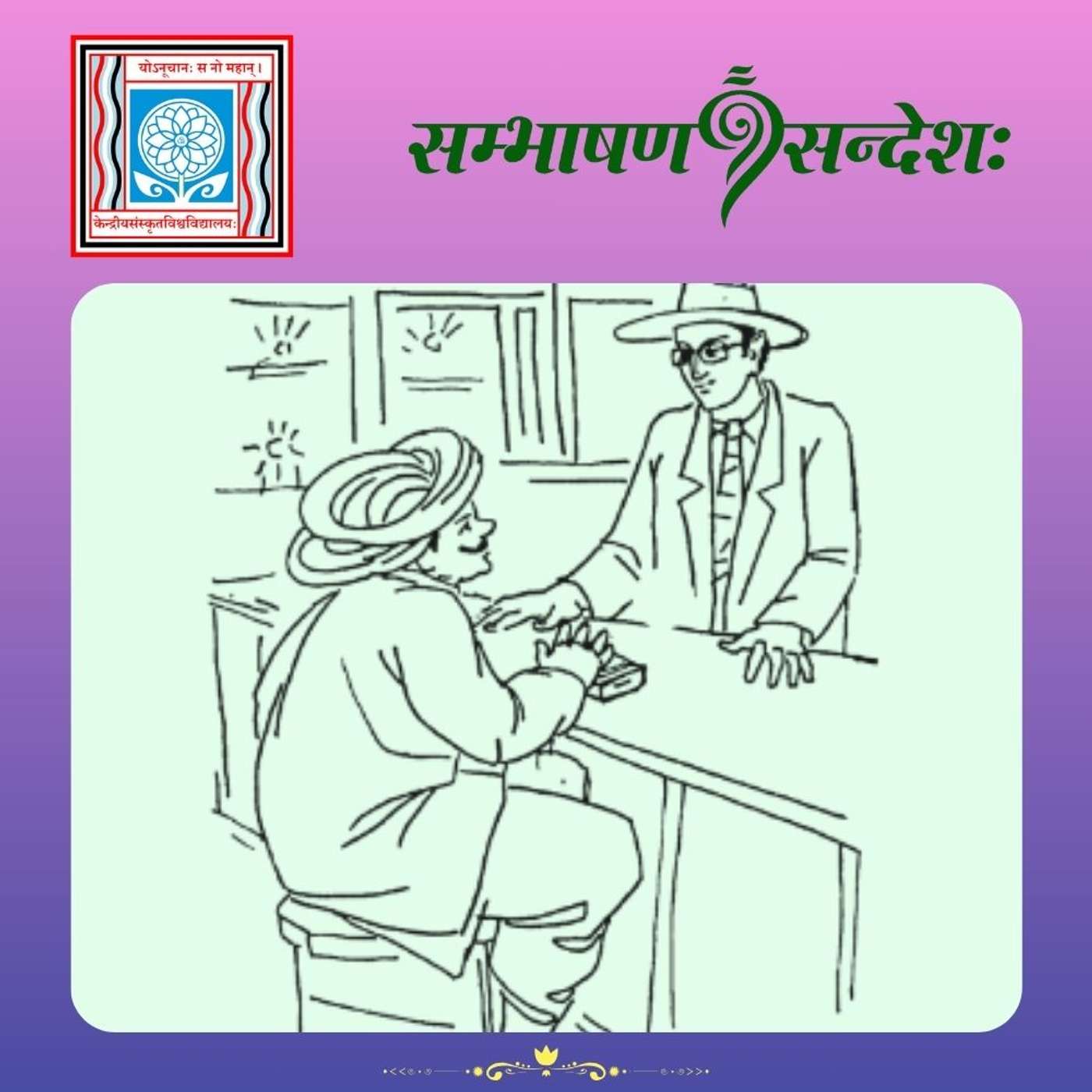
कदाचित् राज्ञा सयाजिरावेण विदेशयात्रासमये स्वस्य आप्तसहायकत्वेन परिशुद्धः प्रामाणिकः निष्ठावान् च शिन्धेवर्यः नीतः । राजा प्यारिस्नगरे सुवर्णापणे बहूनि आभरणानि क्रीतवान् इति कारणतः तस्य आपणस्य प्रतिनिधिः आगत्य शिन्धेवर्याय उपायनं दातुं प्रयतते, किन्तु शिन्धेवर्यः तन्निराकरोति । तर्हि भवतः परिशुद्धं व्यवहारं महाराजं वदामि इति यदा वदति प्रतिनिधिः, तदपि निराकरोति शिन्धेवर्यः । तदा प्रतिनिधिः 'निष्ठायाः प्रामाणिकतायाः बलात् एतावतः धनस्य त्यागं कर्तुम् अपि सिद्धाः जनाः सन्ति खलु भारते' इति साश्चर्यं चिन्तयन् तं मनसा अभिनन्दितवान् ।
(“केन्द्रीयसंस्कृतविश्वविद्यालयस्य अष्टादशीयोजनान्तर्गततया एतासां कथानां ध्वनिप्रक्षेपणं क्रियते”)
During his foreign travels, King Sayajirao took with him Sindhevaraya, a trusted aide known for his honesty, integrity, and loyalty. While in Paris, the king purchased many gold ornaments from a jewelry shop. Later, a representative from the shop approached Sindhevaraya, offering him a gift as a token of appreciation. However, Sindhevaraya firmly refused. The representative then said, "Ok, at least I will inform the king about your honesty". Even then, Sindhevaraya declined. Amazed by his unwavering integrity, the representative thought to himself, "There are people in India who are so committed to honesty that they are willing to reject even great wealth!" He silently admired and respected Sindhevaraya for his principles.
रोटिकाद्वयम्
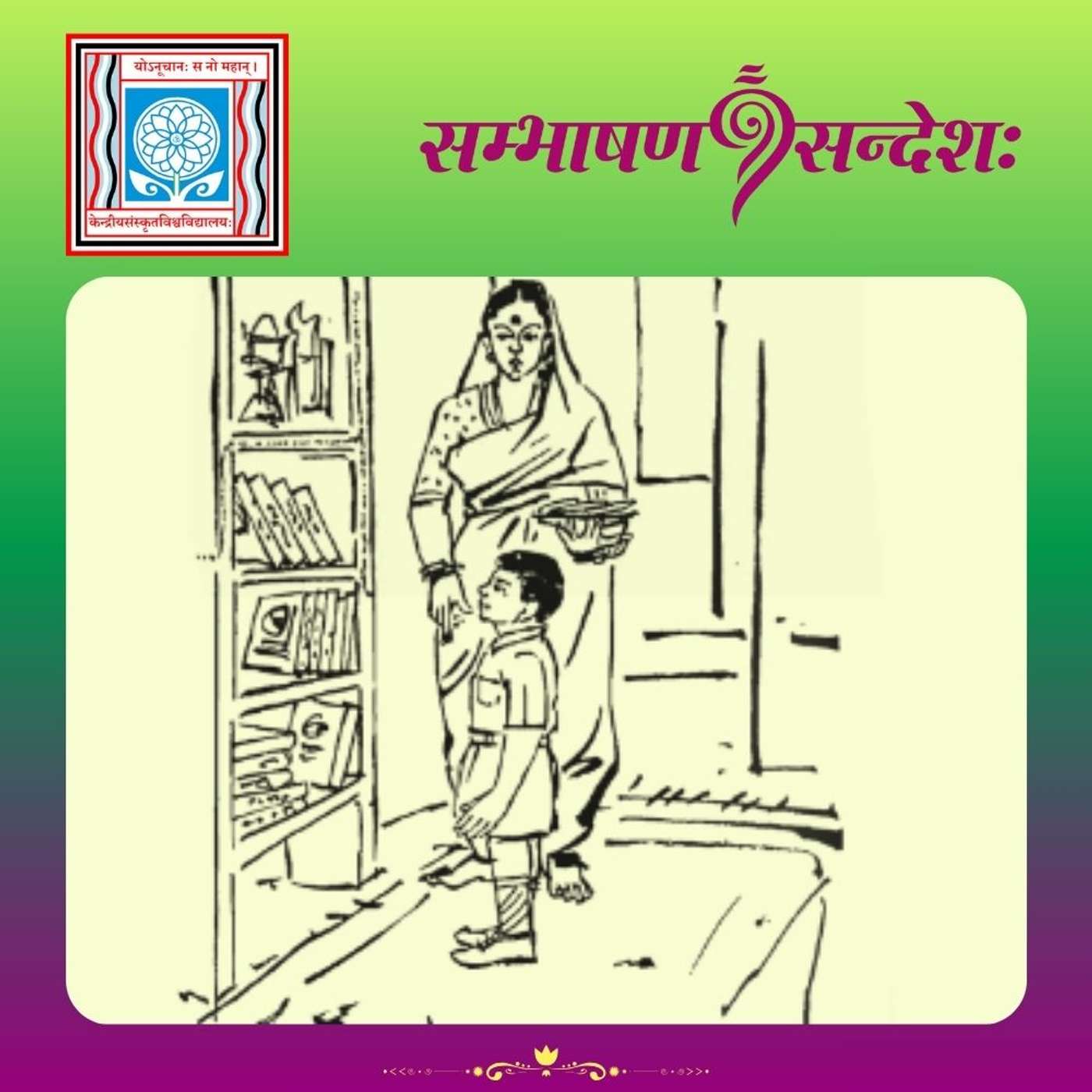
कदाचित् पुत्रस्य पुस्तकानां निधानिकातः पिपीलिकाः पङ्क्तिशः आगच्छन्ति स्म । पुस्ताकानि निष्कास्य माता तत्र रोटिकाद्वयम् दृष्टवती । विद्यालयतः आगवन्तं पुत्रं माता अपृच्छत् । तदा म्लानमुखः पुत्रः अवदत् 'इतः परं रोटिकानाम् आवश्यकता नास्ति । विद्यालयस्य मार्गे उपविष्टायै वृद्धायै अहं प्रतिदिनं रोटिकाद्वयं ददामि स्म । ह्यः सा न आसीत् इत्यतः निधानिकायां स्थापितवान् आसम् । अद्य ज्ञातवान् यत् सा वृद्धा मृता' इत्युक्त्वा रोदनम् आरब्धवान् । पुत्रस्य एतादृशं स्वभावं दृष्ट्वा माता अतीव सन्तुष्टा जाता । सः बालकः एव क्रान्तिकारी सुभाषचन्द्रः बसुः ।
(“केन्द्रीयसंस्कृतविश्वविद्यालयस्य अष्टादशीयोजनान्तर्गततया एतासां कथानां ध्वनिप्रक्षेपणं क्रियते”)
One day, a line of ants emerged from a boy’s bookshelf. When his mother removed the books, she discovered two rotis inside. Later, when her son returned from school, she asked him about it. With a downcast face, he replied, "I no longer need these rotis. Every day, I used to give them to an old woman sitting by the roadside near my school. But yesterday, she was not there, so I kept them on the shelf. Today, I found out that she has passed away". Saying this, he began to cry. Seeing her son's kind and compassionate nature, his mother felt immense pride. That boy later grew up to be the revolutionary leader Subhash Chandra Bose.
वीरवनिता
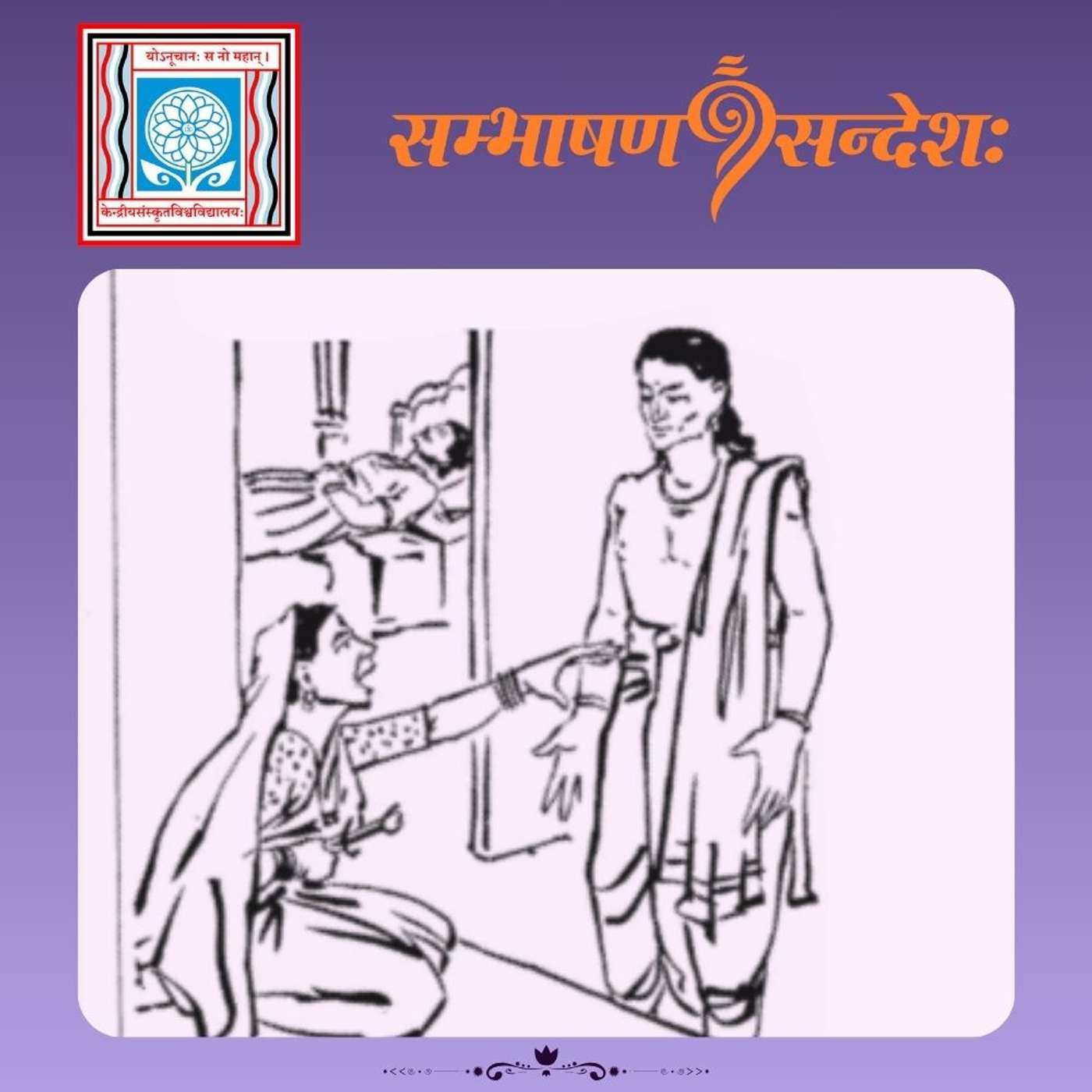
दुर्गादासः महाराष्ट्रराज्यस्य अप्रतिमशूरेषु अन्यतमः यः मोगलराजानां सिंहस्वप्नायते स्म । मोगलराजाः तं हन्तुं सर्वदा प्रयतन्ते स्म । कदाचित् तीर्थयात्रासमये दुर्गादासः कस्यचित् मराठनायकस्य गृहे उषितवान् । सः मराठनायकः मोगलराजस्य सेवकः आसीत् । दुर्गादासं हत्वा प्रभूतं पारितोषिकं प्राप्यते इति विचिन्त्य स्वपत्नीम् उक्तवान् । परन्तु अतिथिरूपेण आगतं देशभक्तं मारयितुं सा अनिच्छां प्रकटयति । तां नुदित्वा यदा मराठनायकः खड्गेन हन्तुम् उद्युक्तः तदा सा धावित्वा तस्य हस्तात् खड्गम् आकृष्य स्व-उरसः भेदनं कृतवती । एतत् दृष्ट्वा सः मराठनायकः दुर्गादासम् उत्थाप्य क्षमां संप्रार्थ्य स्वयमपि आत्मार्पणं कृतवान्
(“केन्द्रीयसंस्कृतविश्वविद्यालयस्य अष्टादशीयोजनान्तर्गततया एतासां कथानां ध्वनिप्रक्षेपणं क्रियते”)
Durgadas was one of Maharashtra's greatest warriors, feared like a lion in the dreams of Mughal emperors. The Mughals constantly sought to kill him. Once, during a pilgrimage, Durgadas stayed at the house of a Maratha leader, who was a servant of the Mughal emperor. The leader, tempted by the prospect of a great reward, decided to kill Durgadas and shared his plan with his wife. However, she refused to betray a patriot who had come as a guest. Ignoring her objections, the leader raised his sword to strike. In a desperate act, his wife rushed forward, snatched the sword from his hand, and pierced her own chest. Witnessing this, the Maratha leader was overcome with remorse. He helped Durgadas to his feet, begged for forgiveness, and ultimately sacrificed his own life in repentance.
अपूर्वः विजयः
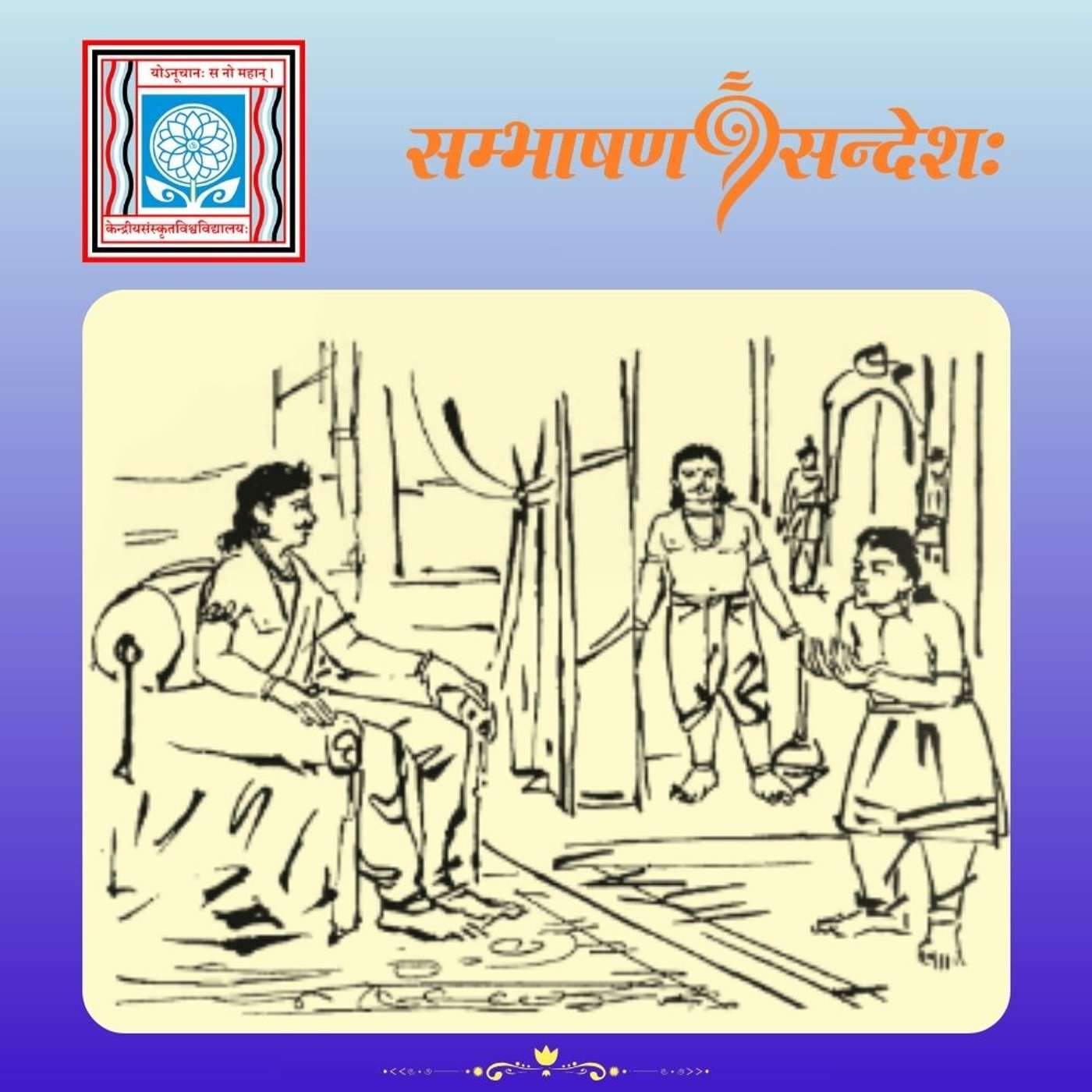
कदाचित् कश्चन याचकः युधिष्ठरं नमस्कृत्य शतं नाणकानि याचितवान् । 'श्वः दास्यामि' इत्युक्त्वा तं प्रेषितवान् युधिष्ठिरः । एतत् दृष्टवता स्मितहासेन भीमसेनेन विजयघण्टा वादिता । विजयस्य कारणं किम् इति यदा युधिष्ठिरः अपृच्छत् तदा भीमसेनः अवदत् 'श्वः दास्यामि इत्युक्तस्य अर्थः यत् श्वः पर्यन्तं भवान् निश्चयेन जीविष्यति इति । मृत्योः उपरि एव दिनपर्यन्तकः विजयः किं सामान्यः ?’ इति । युधिष्ठिरः भीमेन उक्तस्य तात्पर्यम् अवगत्य लज्जितः सन् गच्छन्तं तं याचकः पुनः आहूय तस्मै शतं नाणकानि दत्तवान् ।
(“केन्द्रीयसंस्कृतविश्वविद्यालयस्य अष्टादशीयोजनान्तर्गततया एतासां कथानां ध्वनिप्रक्षेपणं क्रियते”)
One day, a beggar approached Yudhishthira, bowed to him, and requested a hundred coins. Yudhishthira told him, "I will give them tomorrow," and sent him away. Observing this, Bhima smiled and rang the victory bell. When Yudhishthira asked the reason for the celebration, Bhima replied, "By saying 'I will give tomorrow,' you are assuming with certainty that you will live until then. Is victory over death for a whole day such a small thing?" Realizing the deeper meaning behind Bhima’s words, Yudhishthira felt ashamed. He immediately called back the beggar and gave him the hundred coins without delay.
जयदेवस्य औदार्यम्
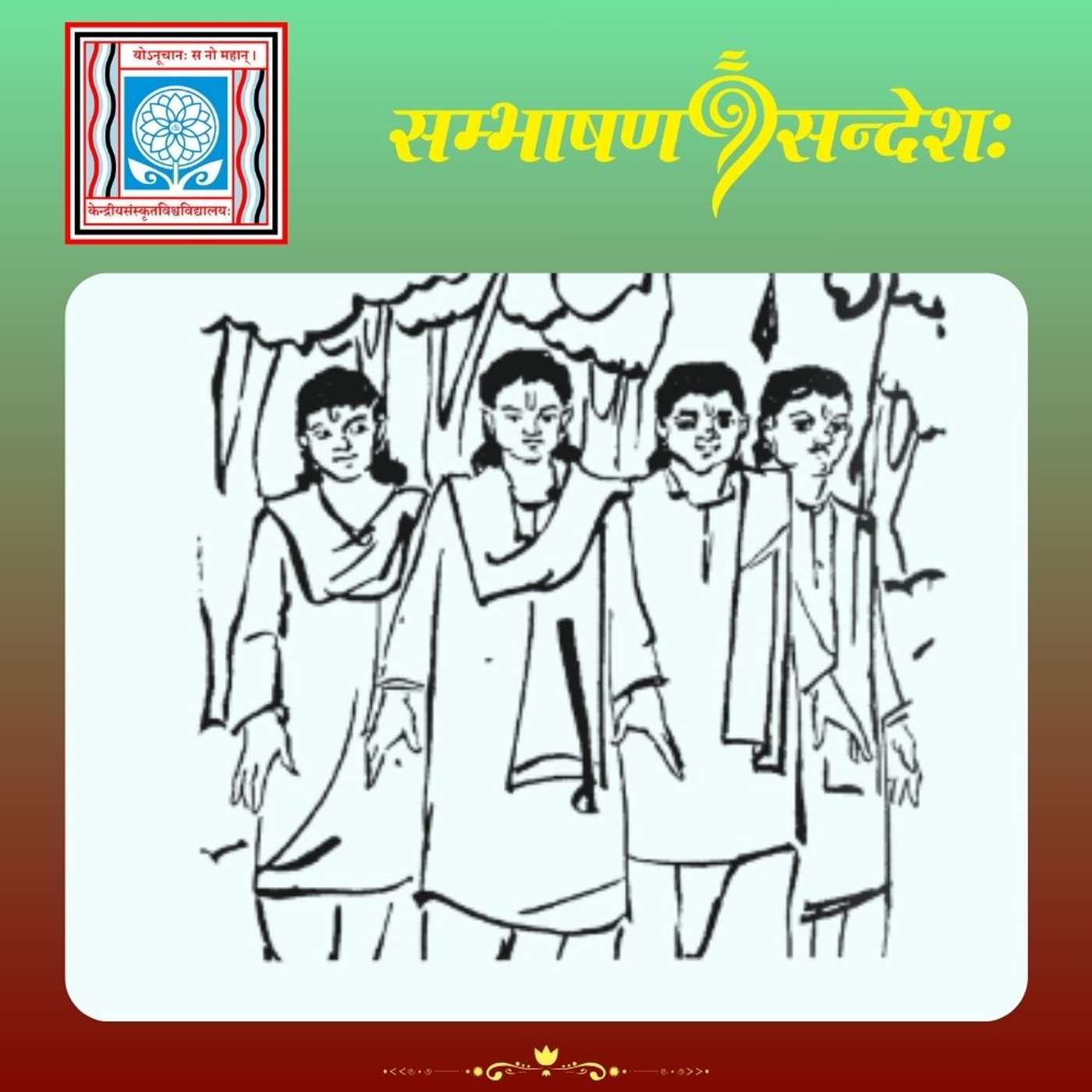
गीतगोविन्दस्य रचयिता जयदेवः सुप्रसिद्धः महाकविः । कदाचित् तीर्थयात्रां कुर्वतः तस्य सम्माननं कृत्वा जनाः तस्मै धनमपि दत्तवन्तः । केचन लुण्ठकाः जयदेवस्य पाणिपादं कर्तयित्वा एकस्मिन् कूपे प्रक्षिप्य धनम् अपहृतवन्तः । तस्मिन् एव मार्गे गच्छता गौडेश्वरेण लक्ष्मणसेनेन मनुष्यस्य ध्वनिः श्रुता । कूपतः जयदेवम् आनाय्य राजधानीं नीतवान् । बहुवारं पृष्टः अपि जयदेवः स्वस्य पाणिपादं कर्तितवतां लुण्ठकानां विषये किमपि न उक्तवान् । तस्य भगवद्भक्तिं साधुस्वभावं च दृष्ट्वा महाराजः तं स्वस्य आस्थानपण्डितम् अकरोत् ।
(“केन्द्रीयसंस्कृतविश्वविद्यालयस्य अष्टादशीयोजनान्तर्गततया एतासां कथानां ध्वनिप्रक्षेपणं क्रियते”)
Jayadeva, the renowned poet and composer of the Gita Govinda, once embarked on a pilgrimage. During his journey, people honored him and offered him wealth. However, some robbers severed his hands and feet, threw him into a well, and stole his money. Lakshmanasena, the king of Gauda, was passing by the same route when he heard a voice from the well. He rescued Jayadeva and brought him to the capital. Despite being repeatedly questioned, Jayadeva never revealed the identities of the robbers who had mutilated him. Impressed by his devotion to God and saintly nature, the king appointed him as his court scholar.
वणिजः कृपणता
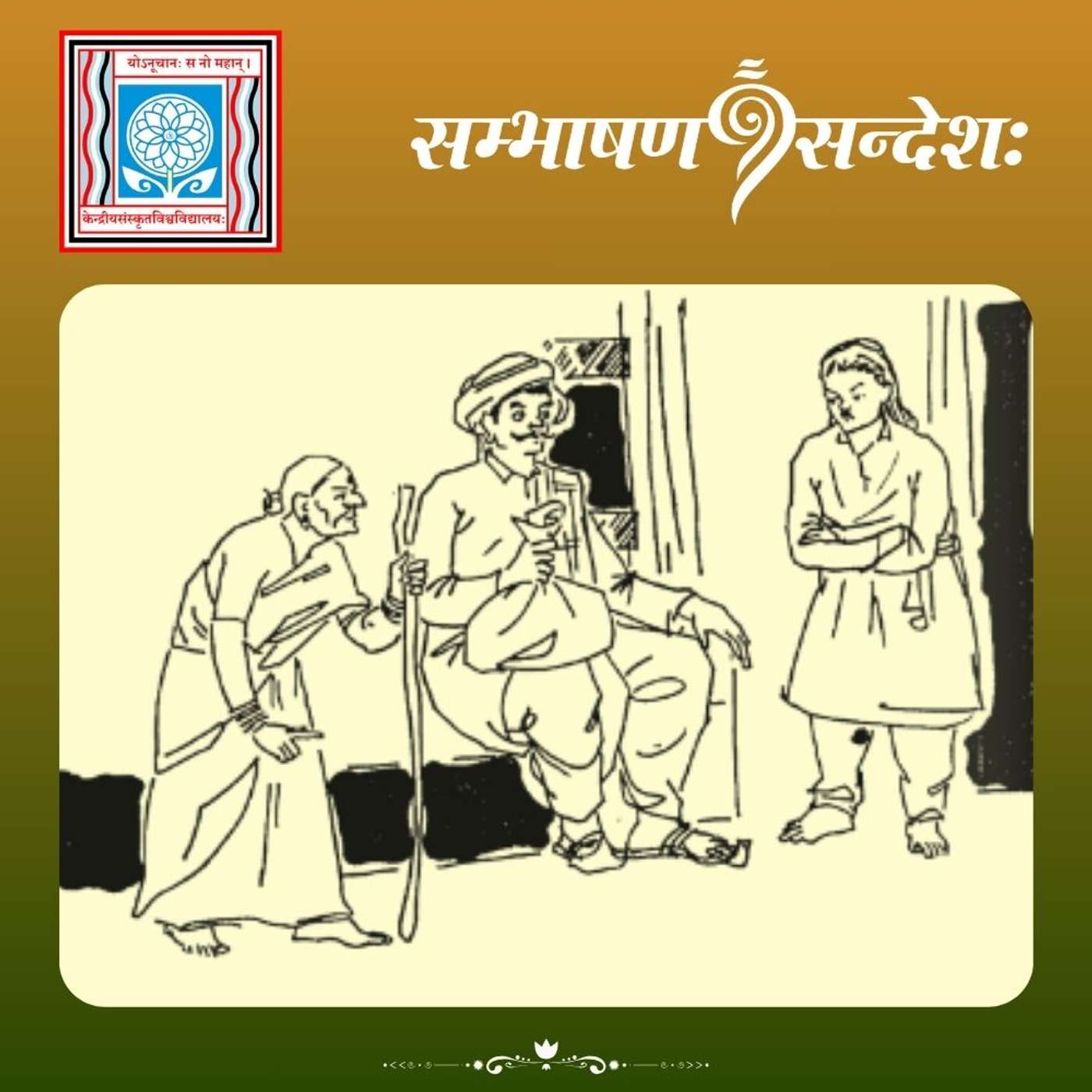
कस्यचन कृपणस्य वणिजः धनस्यूतः च्युतः जातः । तस्मिन् चतुस्सहस्ररूप्यकाणि आसन् । ग्रामप्रमुखस्य द्वारा घोषणं कारितवान् यत् यः तं धनस्यूतं यच्छति तस्मै चतुश्शतं रूप्यकाणि ददामि इति । कयाचित् वृद्धया सः धनस्यूतः प्राप्तः । ग्रामप्रमुखं गत्वा दत्तवती । कृपणः वणिक् वृद्धायै चतुश्शतं रूप्यकाणि दातुं नेच्छत् । सः अवदत् 'अस्मिन् धनस्यूते चतुश्शताधिकचतुस्सहस्रं रूप्यकाणि आसन् । एषा वृद्धा पूर्वमेव चतुश्शतं रूप्यकाणि स्वीकृतवती अस्ति' इति । ग्रामप्रमुखेन ज्ञातं यत् एषः असत्यं वदन् अस्ति इति । 'भवता केवलं चतुस्सहस्ररूप्यकाणि एव आसन् इति उक्तमासीत् अतः एषः भवतः स्यूतः नास्ति' इत्युक्त्वा तं धनस्यूतं स्वीकृतवान् ।
(“केन्द्रीयसंस्कृतविश्वविद्यालयस्य अष्टादशीयोजनान्तर्गततया एतासां कथानां ध्वनिप्रक्षेपणं क्रियते”)
A miserly merchant lost his money bag, which contained four thousand rupees. He announced through the village chief that whoever returned the bag would receive four hundred rupees as a reward. An old woman found the bag and handed it over to the village chief. However, the miserly merchant refused to give her the promised reward. He falsely claimed that the bag originally contained four thousand four hundred rupees, implying that the old woman had already taken four hundred rupees. The village chief realized that the merchant was lying and said, "You had stated that the bag contained only four thousand rupees. Therefore, this bag does not belong to you". He then kept the money bag, denying the merchant's claim.
तृतीयं नेत्रम्
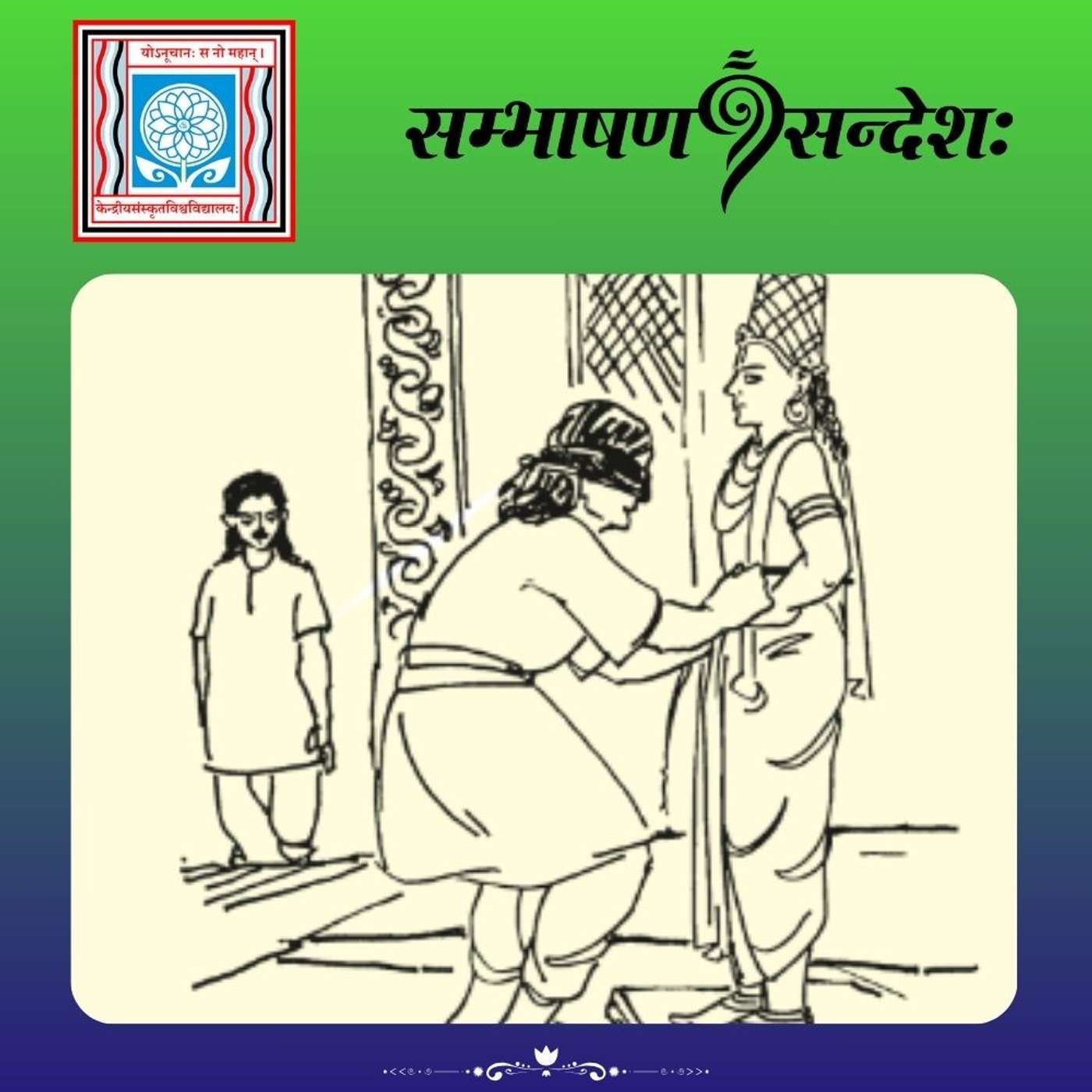
सदाचारसम्पन्नः नरहरिः सुवर्णकारः आसीत् । सः शिवेतरदेवानां देवालयं कदापि न गच्छति स्म । कदाचित् धनिकेन कनकदासेन विठ्ठलमन्दिरं निर्माप्य विठ्ठलाय एका सुवर्णमेखला समर्पणीया इति इच्छा प्रकटिता । तदर्थं सुवर्णकारं नरहरिं यदा अपृच्छत् तदा नरहरिः नेत्रयोः उपरि वस्त्रपट्टिकाबन्धनं कृत्वा विठ्ठलस्य कटेः मापनं कर्तुम् अङ्गीकृतवान् । मापनसमये त्रिवारम् अपि शिवस्य मूर्तिः इव प्रतिभासते तस्मै । तृतीयवारं नेत्रपट्टिकाम् अपसार्य विठ्ठलस्य मूर्तिम् अपश्यत् । मूर्तिः अवदत् 'अहं स्वयं शिवः । एकोऽहं विविधैः रूपैः दृश्ये' इति । तदा प्रभृतिः नरहरिः विठ्ठलस्य परमभक्तः जातः ।
(“केन्द्रीयसंस्कृतविश्वविद्यालयस्य अष्टादशीयोजनान्तर्गततया एतासां कथानां ध्वनिप्रक्षेपणं क्रियते”)
Narahari, a virtuous goldsmith, never visited temples of deities other than Shiva. Once, a wealthy man named Kanakadasa wished to offer a golden waistband to Lord Vitthala and sought Narahari’s help. Narahari, unwilling to see Vitthala’s idol, blindfolded himself while measuring the deity’s waist. Amazingly, three times also he perceived the idol as Shiva. On the third attempt, he removed the blindfold and saw Vitthala’s idol, which said, "I am Shiva himself, appearing in different forms". From that moment, Narahari became a devoted follower of Vitthala.
सत्यप्रियता
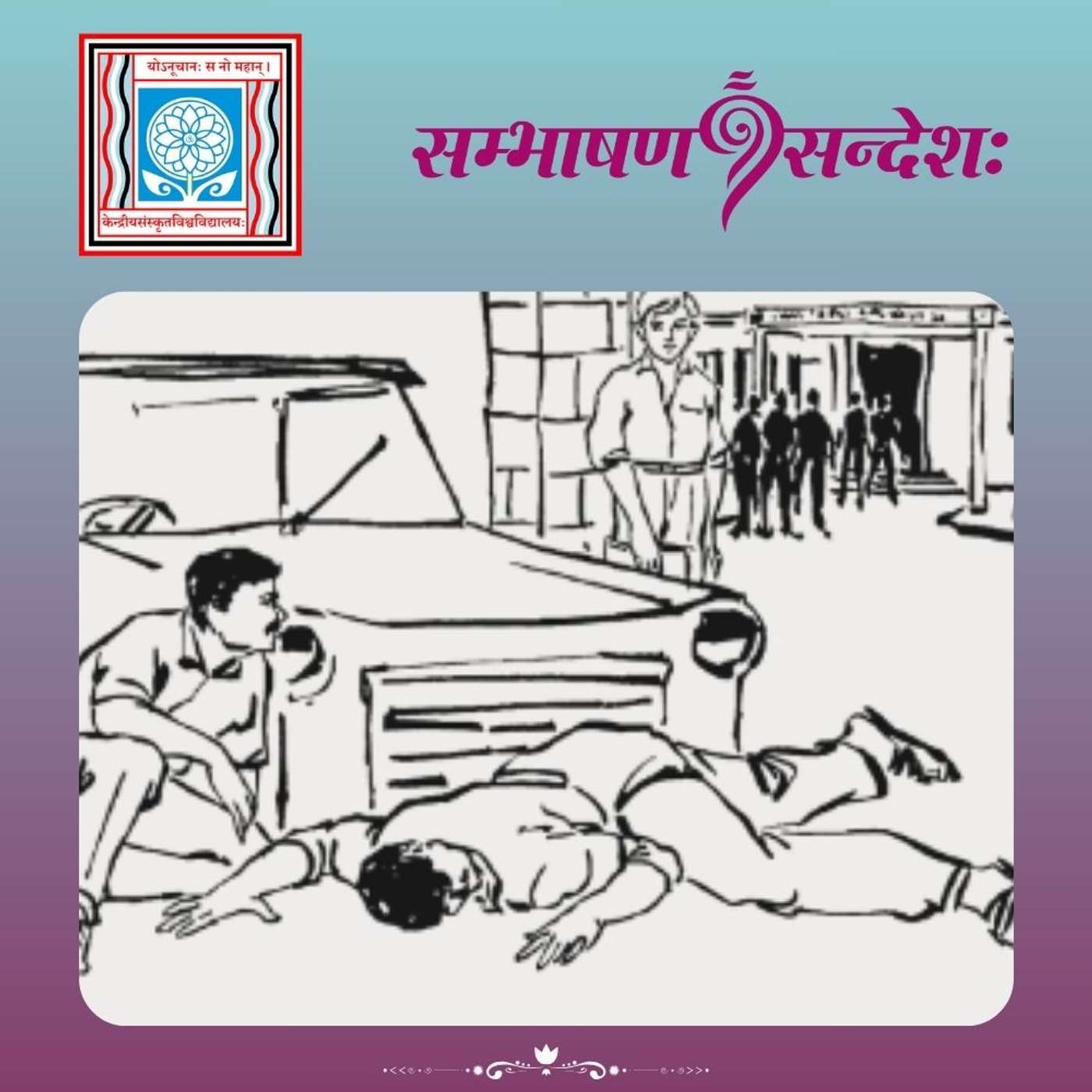
विधानचन्द्रः श्रेष्ठः राजनीतिज्ञः चिकित्सकश्च आसीत् । भारतरत्नबिरुदभाक् सः पश्चिमबङ्गालस्य मुख्यमन्त्री आसीत् । अत्यन्तं बुद्धिमान् सः छात्रदशायां प्रत्येकं परीक्षायामपि प्रथमस्थानं प्राप्नोति स्म । परं च एकदा सः महाविद्यालये परीक्षायाम् अनुत्तीर्णः जातः । तत् कथम् इति जानन्ति वा ? तस्य सत्यप्रियतायाः कारणेन । इयं कथा विधानचन्द्रस्य सत्यप्रियतां कथयति ।
(“केन्द्रीयसंस्कृतविश्वविद्यालयस्य अष्टादशीयोजनान्तर्गततया एतासां कथानां ध्वनिप्रक्षेपणं क्रियते”)
Vidhanchandra was an excellent politician and doctor, serving as the Chief Minister of West Bengal and earning the Bharat Ratna. Exceptionally intelligent, he secured the top rank in every exam during his student years. However, once in college, he failed an exam. Do you know why? It was due to his unwavering honesty. This story highlights Vidhanchandra’s deep commitment to truthfulness.
समयप्रज्ञा
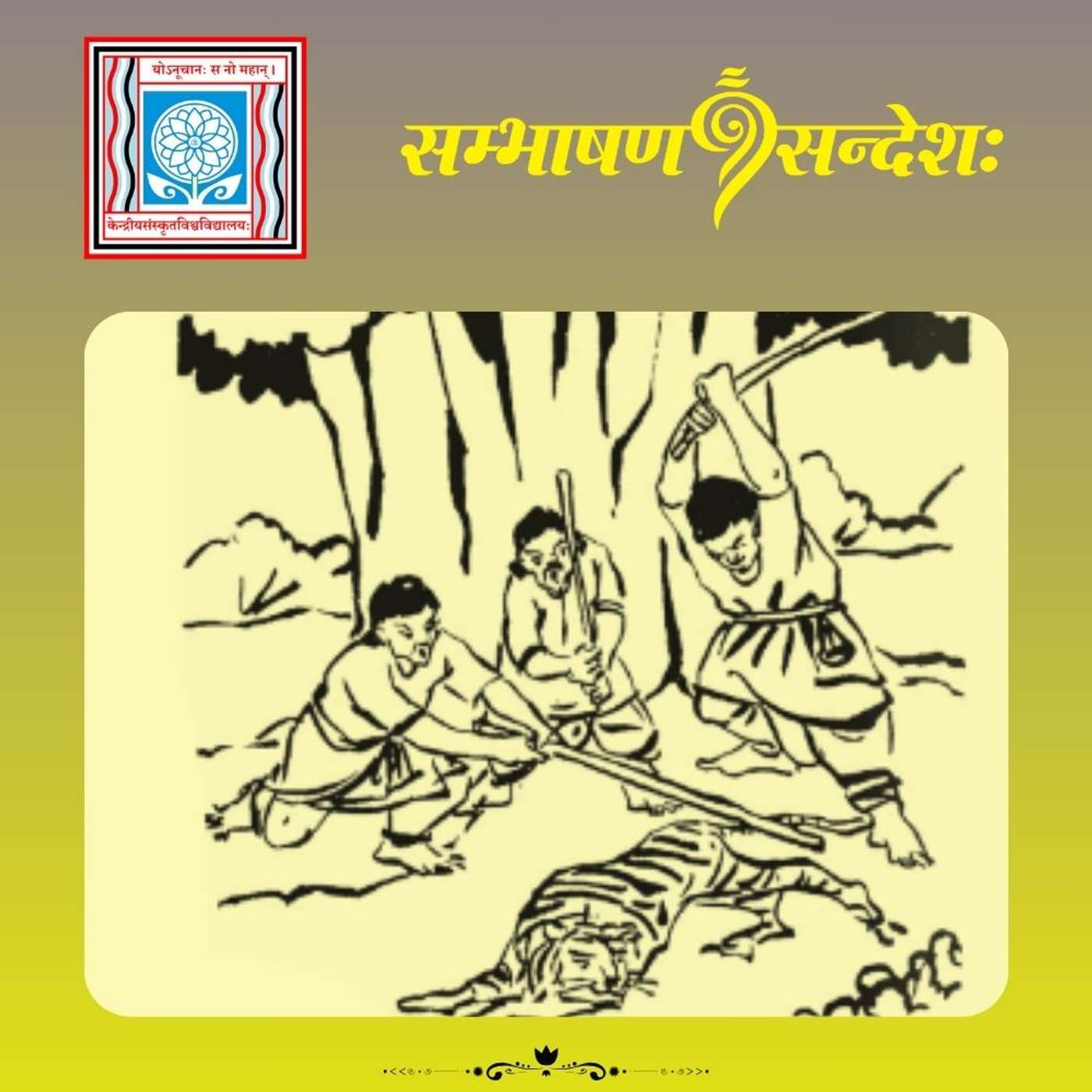
कश्चन बुद्धिमान् युवकः दुर्गादासः कदाचित् रात्रौ 'चोरः चोरः' इति चीत्कारं कृतवान् । तदा ग्रामीणाः सर्वविधानि आयुधानि स्वीकृत्य चोरं ग्रहीतुम् आगतवन्तः । किन्तु न्यग्रोधवृक्षस्य पुरतः महान् व्याघ्रः तैः दृष्टः । अनुक्षणमेव सर्वे मिलित्वा लवित्रैः दण्डैश्च तं मारितवन्तः । अनन्तरं जनाः 'किमर्थं चोरः इति उक्तवान् भवान्' इति यदा अपृच्छन् तदा मन्दहासपूर्वकं अवदत् दुर्गादासः 'चोरः इति मत्वा भवन्तः सर्वे गृहात् बहिः आगतवन्तः । यदि अहं व्याघ्रः इति आक्रोशम् अकरिष्यं तर्हि भवन्तः सर्वे आगमिष्यन् ? अतः एव अहं चोरः चोरः इति आक्रुष्टवान्' इति । सर्वे दुर्गादासस्य समयप्रज्ञां श्लाघितवन्तः ।
(“केन्द्रीयसंस्कृतविश्वविद्यालयस्य अष्टादशीयोजनान्तर्गततया एतासां कथानां ध्वनिप्रक्षेपणं क्रियते”)
One night, a clever young man named Durgadas shouted, "Thief! Thief!" Hearing this, the villagers rushed out with weapons to catch the thief. However, instead of a thief, they found a fierce tiger near a banyan tree. Immediately, they united and killed the tiger with axes and sticks. Later, they asked Durgadas why he had shouted "Thief!" instead of "Tiger!" Smiling, he replied, "Had I shouted 'Tiger,' would you all have come out? But by saying 'Thief,' I ensured everyone rushed out". The villagers praised his wisdom and presence of mind.
वास्तविकः ज्ञानी
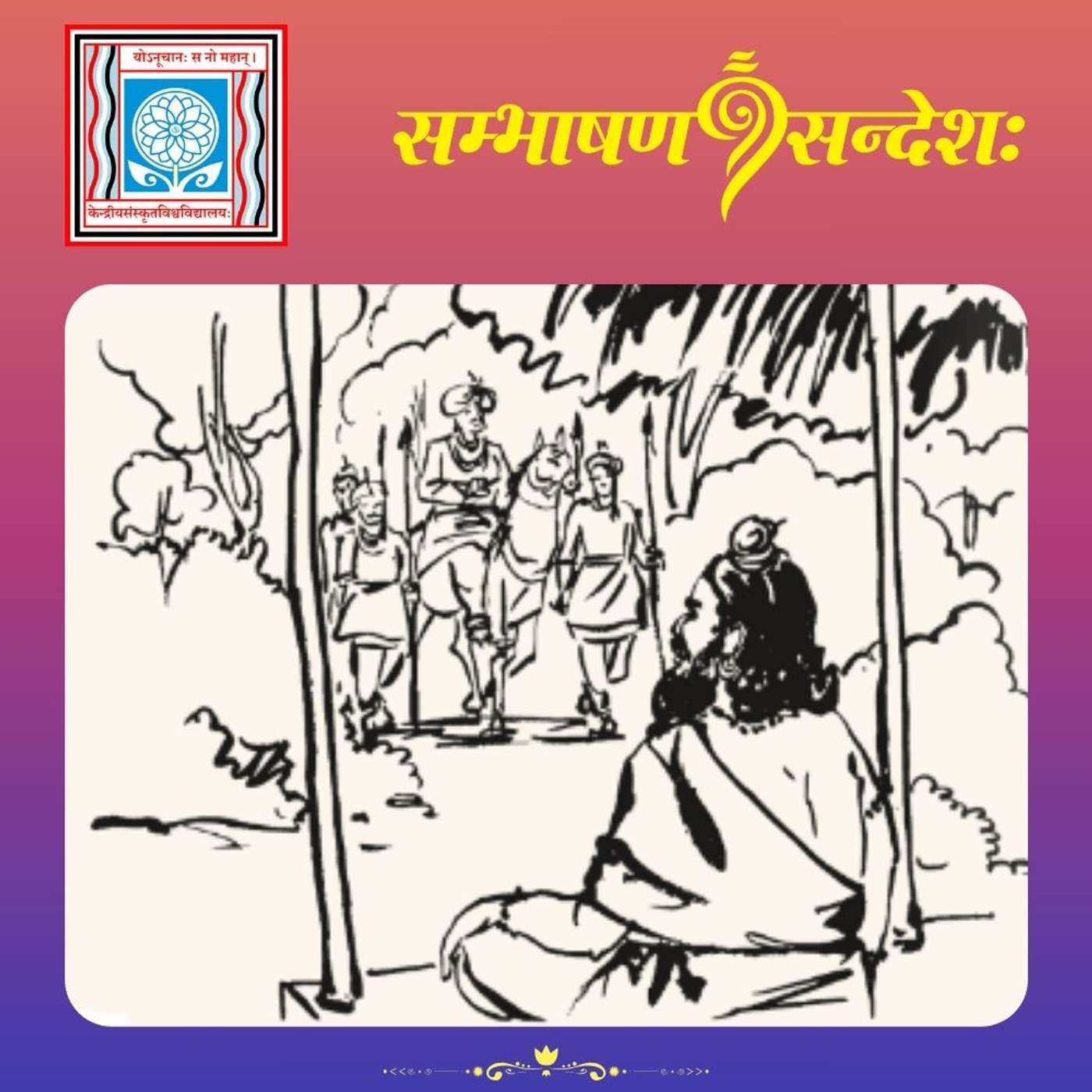
महर्षेः कणादस्य प्रसिद्धिं श्रुत्वा तत्रत्यः राजा तस्य दर्शनलाभं प्राप्तुम् इष्टवान् । सः महर्षिं नमस्कृत्य सेवकानां द्वारा नीतानि वज्रवैडूर्यादिभिः पूर्णानि पात्राणि अयच्छत् । किन्तु महर्षिः उपायनं न स्वीकृतवान् । किमर्थम् इति पृष्टे महर्षिः अवदत् 'महाराज ! जनानां वचनं श्रुत्वा मह्यम् उपायनं दीयते भवता । यदि जनाः मम विषये दुर्वचनानि अवदिष्यन् तर्हि भवान् मह्यं दण्डनम् अदास्यत् । केवलं कर्णाभ्यां श्रुतेषु वचनेषु विश्वस्य दत्तम् उपायनम् अहं न स्वीकरोमि' इति । एषः महर्षिः वास्तविकः महाज्ञानी इति इदानीं महाराजः ज्ञातवान् ।
(“केन्द्रीयसंस्कृतविश्वविद्यालयस्य अष्टादशीयोजनान्तर्गततया एतासां कथानां ध्वनिप्रक्षेपणं क्रियते”)
Hearing of the great sage Kanāda’s fame, a local king wished to meet him. After paying his respects, the king offered vessels filled with precious gems through his attendants. However, the sage refused the gift. When asked why, he replied, "O King! You offer me gifts based on what people say about me. If they had spoken ill of me, would you have punished me instead? I do not accept rewards merely based on hearsay". Realizing the sage’s true wisdom, the king understood that Kanāda was indeed a great enlightened soul.
न फलति भाग्यम् अलसस्य
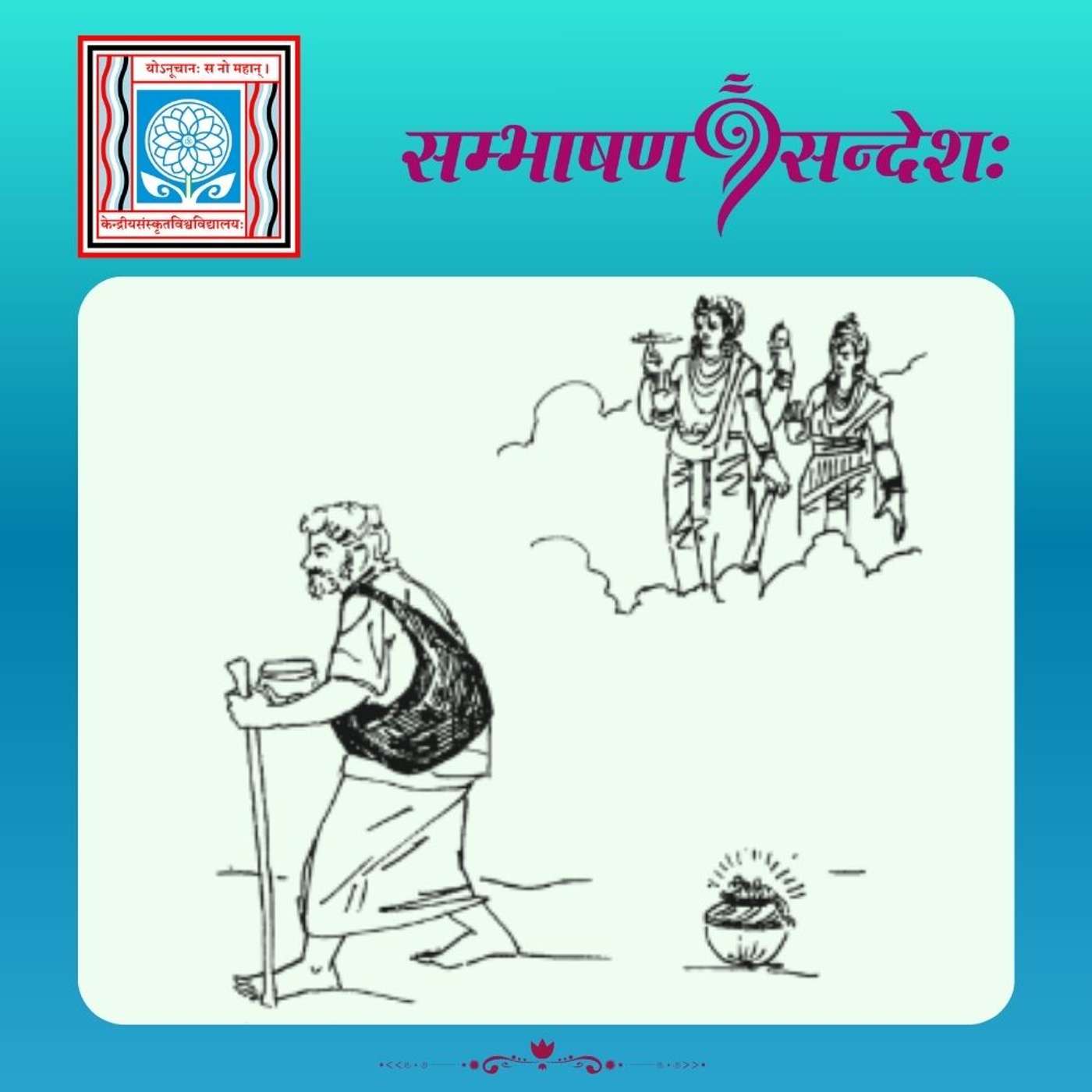
सुमन्तकनामकः कश्चित् अलसः गृहजनैः पुनः पुनः उपदेशे कृते गृहमेव परित्यज्य गतवान् । भिक्षावृत्त्या उदरपोषणं कुर्वन् ग्रामान् नगराणि च अटितवान् । कदाचित् भगवती लक्ष्मीदेवी सुमन्तकं दृष्ट्वा अतीव दयापूर्णा जाता । सा स्वपतिं विष्णुं किमपि साहाय्यं कर्तुम् अवदत् । एषः सर्वथा अलसः इत्यतः तस्य भाग्यं न फलति इति अवदत् विष्णुः । लक्ष्म्याः पुनः पुनः अनुरोधेन सः एकं रत्नैः पूर्णं घटं सुमन्तकस्य मार्गे स्थापितवान् । किन्तु यथा विष्णुना उक्तं तथैव कृतवान् सुमन्तः । तस्य आलस्यं दृष्ट्वा लक्ष्मीः विस्मिता अभवत् ।
(“केन्द्रीयसंस्कृतविश्वविद्यालयस्य अष्टादशीयोजनान्तर्गततया एतासां कथानां ध्वनिप्रक्षेपणं क्रियते”)
Sumantaka, a lazy man, left his home despite repeated advice from his family. He wandered through villages and cities, surviving on alms. Seeing his plight, Goddess Lakshmi felt deep compassion and requested Lord Vishnu to help him. Vishnu replied, "He is completely lazy, so his fortune will not bear fruit". At Lakshmi’s insistence, Vishnu placed a pot full of gems in Sumantaka’s path. However, as Vishnu had predicted, Sumantaka remained indifferent due to his laziness. Witnessing this, Lakshmi was astonished.
